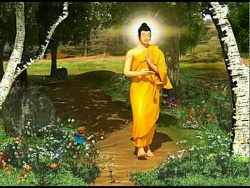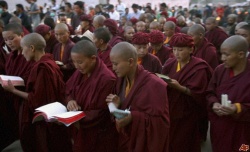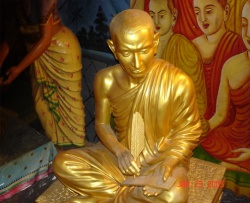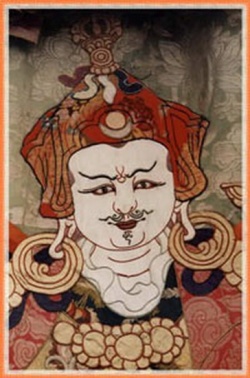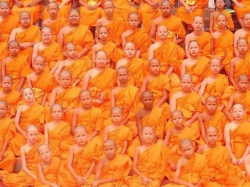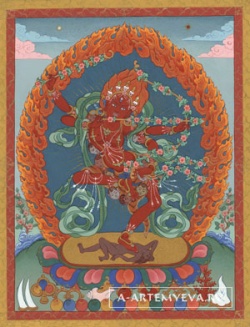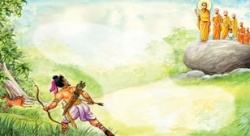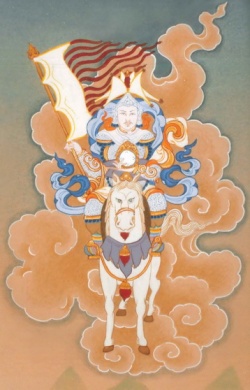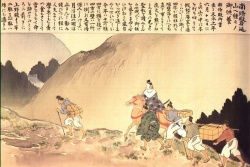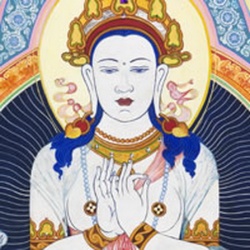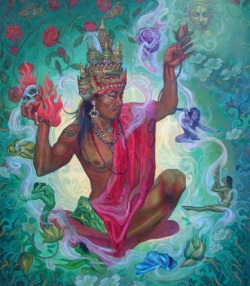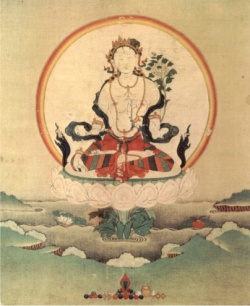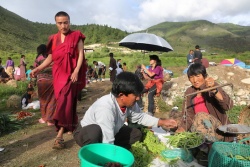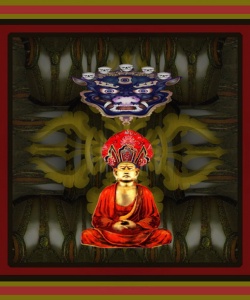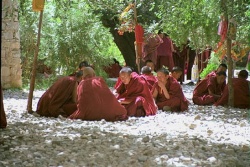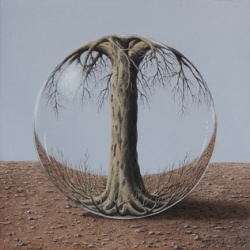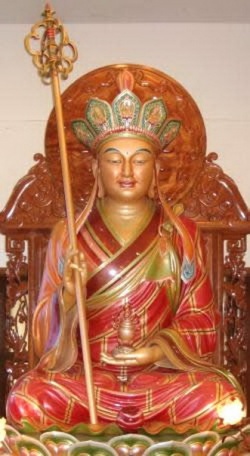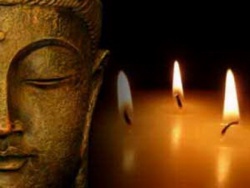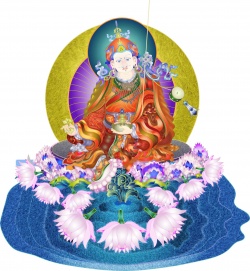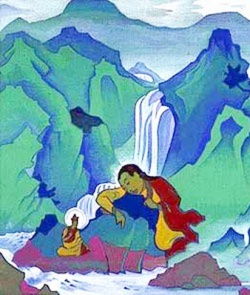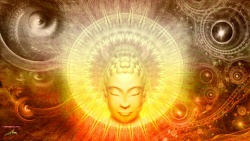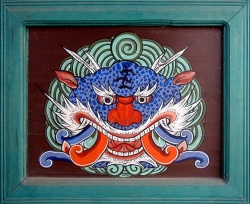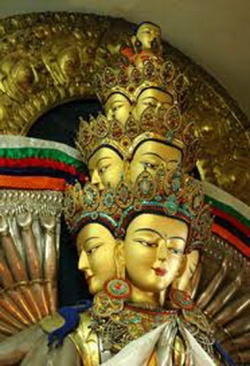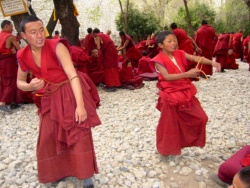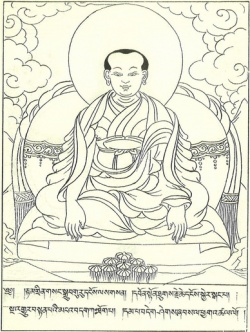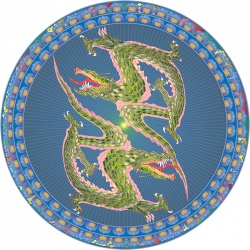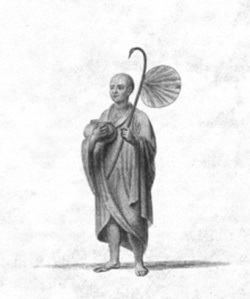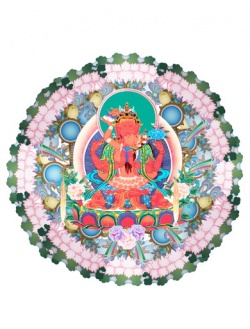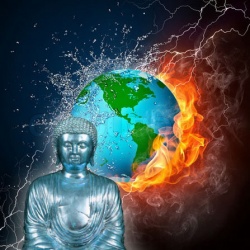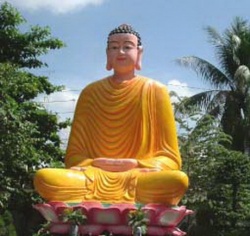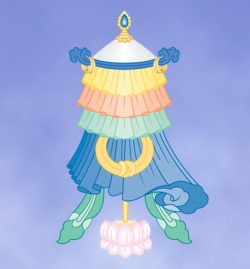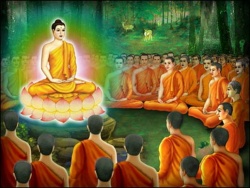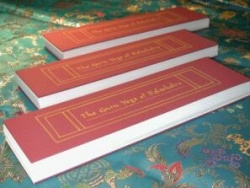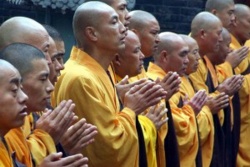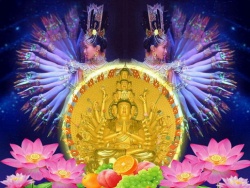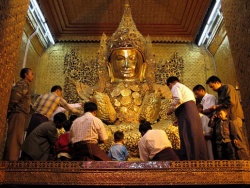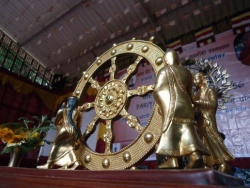Difference between revisions of "The Wonderful Dharma Lotus Flower Sutra with commentary by the Venerable Master Hsuan Hua: Chapter 18: Rejoicing in Accord with Merit and Virtue"
(Created page with "{{DisplayImages|849|445|2888|1277|3076|2292|1373|3404|411|2775|1271|2860|651|2731|1192|3299|97|1905|118|674|10|3003|2664|341|1187|1953|2530|1661|357|2258|1307|1989|1496|3524|1...") |
|||
| Line 1: | Line 1: | ||
| − | {{DisplayImages|849|445|2888|1277|3076|2292|1373|3404|411|2775|1271|2860|651|2731|1192|3299|97|1905|118|674|10|3003|2664|341|1187|1953|2530|1661|357|2258|1307|1989|1496|3524|1108|3583|258|1273|560|808 | + | {{DisplayImages|849|445|2888|1277|3076|2292|1373|3404|411|2775|1271|2860|651|2731|1192|3299|97|1905|118|674|10|3003|2664|341|1187|1953|2530|1661|357|2258|1307|1989|1496|3524|1108|3583|258|1273|560|808|405}} |
{{Centre|<big><big>The Wonderful Dharma Lotus Flower Sutra <br/> | {{Centre|<big><big>The Wonderful Dharma Lotus Flower Sutra <br/> | ||
with commentary by the Venerable Master Hsuan Hua<br/></big></big> | with commentary by the Venerable Master Hsuan Hua<br/></big></big> | ||
| Line 5: | Line 5: | ||
<poem> | <poem> | ||
| − | During the Summer Session, we lectured from the "Jeweled Stupa Chapter" to this chapter. The Summer Session combined study with practice. If you only study and do not cultivate, it is like talking about food or counting other people's money. You can talk about food, but if you do not eat any, you would not get full. On the other hand, if you practice without understanding, you are cultivating blindly. If you want to cultivate, you must first understand how to cultivate. | + | During the Summer Session, we lectured from the "Jeweled [[Stupa]] Chapter" to this chapter. The Summer Session combined study with practice. If you only study and do not cultivate, it is like talking about [[food]] or counting other people's [[money]]. You can talk about [[food]], but if you do not eat any, you would not get full. On the other hand, if you practice without [[understanding]], you are cultivating blindly. If you want to cultivate, you must first understand how to cultivate. |
| − | There are 84,000 Dharma-doors. Even if you do not learn all 84,000 of them, you should at least learn eighty-four! Then, you will know how to go about cultivating. If you do not learn eighty-four, or even a Dharma-door, you would not know how to walk the path of cultivation. If you want to go on a vacation, you have to take along some provisions, money, and travelers’ cheques. Your understanding of the doctrine is like your provisions for the trip. You buy a plane ticket, or a bus ticket, or a boat ticket. Understanding is like currency while practice is like actually going. First you have to buy a ticket; then you can take the appropriate mode of transportation. | + | There are 84,000 Dharma-doors. Even if you do not learn all 84,000 of them, you should at least learn eighty-four! Then, you will know how to go about cultivating. If you do not learn eighty-four, or even a [[Dharma-door]], you would not know how to walk the [[path of cultivation]]. If you want to go on a vacation, you have to take along some provisions, [[money]], and travelers’ cheques. Your [[understanding]] of the [[doctrine]] is like your provisions for the trip. You buy a plane ticket, or a bus ticket, or a boat ticket. [[Understanding]] is like currency while practice is like actually going. First you have to buy a ticket; then you can take the appropriate mode of transportation. |
| − | In cultivation, we must do the same. Not understanding is like not having money to buy your ticket. When you listen to the Sutras and understand, "Oh, there are so many doctrines!" then you can cultivate according to the method. Cultivating will enable you to arrive at your aim. We understand and practice at the same time. When we sit in Dhyana for several hours, we are cultivating; and when we listen to the Sutras, we are increasing our understanding of the methods of cultivation. | + | In cultivation, we must do the same. Not [[understanding]] is like not having [[money]] to buy your ticket. When you listen to the [[Sutras]] and understand, "Oh, there are so many [[doctrines]]!" then you can cultivate according to the method. Cultivating will enable you to arrive at your aim. We understand and practice at the same [[time]]. When we sit in [[Dhyana]] for several hours, we are cultivating; and when we listen to the [[Sutras]], we are increasing our [[understanding]] of the methods of cultivation. |
| − | There is not just one method of cultivating; there are 84,000. You should always listen to the Sutras. Since the Sutras were spoken by the Buddhas, you should learn what the Buddhas said. Do not remain totally ignorant and assume that you can just cultivate, saying, "The Buddha just cultivated. What Sutras did he read? None, and he still became a Buddha." You become arrogant and fall under the influence of externalist teachings, saying things like, "Everybody is a Buddha! Everybody is a Buddha!" until you lose all sense of the meaning of the word. You do this to the point where it will be very difficult for you to ever become a Buddha. | + | There is not just one method of cultivating; there are 84,000. You should always listen to the [[Sutras]]. Since the [[Sutras]] were spoken by the [[Buddhas]], you should learn what the [[Buddhas]] said. Do not remain totally [[ignorant]] and assume that you can just cultivate, saying, "The [[Buddha]] just cultivated. What [[Sutras]] did he read? None, and he still became a [[Buddha]]." You become [[arrogant]] and fall under the influence of externalist teachings, saying things like, "Everybody is a [[Buddha]]! Everybody is a [[Buddha]]!" until you lose all [[sense]] of the meaning of the [[word]]. You do this to the point where it will be very difficult for you to ever become a [[Buddha]]. |
| − | Do not be arrogant and think you are higher than Mount Sumeru and more profound than the four seas. If you do not get arrogant, and if you study and cultivate the Buddhadharma, then you can be said to have understanding and practice. | + | Do not be [[arrogant]] and think you are higher than [[Mount Sumeru]] and more profound than the four seas. If you do not get [[arrogant]], and if you study and cultivate the [[Buddhadharma]], then you can be said to have [[understanding]] and practice. |
| − | During the first summer session, I said to one of my disciples, "We study and meditate. At most Way-places cultivators meditate in the winter and study in the summer. In the winter, they exclusively sit in meditation. In the summer, they exclusively study. They lecture on the Sutras in the summer, but only for two hours a day. The remaining hours go to waste. Those who are self-motivated may be able to learn some Dharma. Those who are not go to sleep after the Sutra lecture is over, or else they run off to play in the mountains. | + | During the first summer session, I said to one of my [[disciples]], "We study and [[meditate]]. At most Way-places {{Wiki|cultivators}} [[meditate]] in the winter and study in the summer. In the winter, they exclusively sit in [[meditation]]. In the summer, they exclusively study. They lecture on the [[Sutras]] in the summer, but only for two hours a day. The remaining hours go to waste. Those who are self-motivated may be able to learn some [[Dharma]]. Those who are not go to [[sleep]] after the [[Sutra]] lecture is over, or else they run off to play in the [[mountains]]. |
| − | This reminds me of myself. The "self" is very small; it is not very big. It is about the size of a mote of dust. But that little mote of dust is enough to keep me from being able to fly. Most dust motes can float through space, but mine cannot. Anyway, when I was studying the teachings, I was studying the teachings of playing in the mountains. (Do not imitate me in this regard.) | + | This reminds me of myself. The "[[self]]" is very small; it is not very big. It is about the size of a mote of dust. But that little mote of dust is enough to keep me from being able to fly. Most dust motes can float through [[space]], but mine cannot. Anyway, when I was studying the teachings, I was studying the teachings of playing in the [[mountains]]. (Do not imitate me in this regard.) |
| − | When the Dharma Master was lecturing, I listened to the Sutras. When the lecture was over, I ran off to the mountains to look at the trees, flowers, and water. I had a lot of fun. My fellow students watched me pretty closely. I never said a word all day long, so nobody knew what I was up to. When the time came for the daily review, most of the students read from their notes. I just recited the whole thing from memory. I repeated everything the Dharma Master had said, neither missing nor adding a word. | + | When the [[Dharma Master]] was lecturing, I listened to the [[Sutras]]. When the lecture was over, I ran off to the [[mountains]] to look at the [[trees]], [[flowers]], and [[water]]. I had a lot of fun. My fellow students watched me pretty closely. I never said a [[word]] all day long, so nobody knew what I was up to. When the [[time]] came for the daily review, most of the students read from their notes. I just recited the whole thing from [[memory]]. I repeated everything the [[Dharma Master]] had said, neither missing nor adding a [[word]]. |
| − | At that time there were thirty of us studying the teachings. Some had studied for over ten years. I was in my first year—three months into my first year, in fact. They thought this was very strange. "How can you repeat the lecture word for word like that? How can you remember it so clearly?" | + | At that [[time]] there were thirty of us studying the teachings. Some had studied for over ten years. I was in my first year—three months into my first year, in fact. They [[thought]] this was very strange. "How can you repeat the lecture [[word]] for [[word]] like that? How can you remember it so clearly?" |
| − | What do you think I said? I said, "I studied it before." To say nothing of studying it, I had not even seen the books before. I said I had studied it because I remembered it immediately when I heard it. So I figured that I must have studied it before somewhere. | + | What do you think I said? I said, "I studied it before." To say nothing of studying it, I had not even seen the [[books]] before. I said I had studied it because I remembered it immediately when I heard it. So I figured that I must have studied it before somewhere. |
They said, "Oh, you studied the teachings before." | They said, "Oh, you studied the teachings before." | ||
| − | "Right," I said. "I have been studying them for a long time." | + | "Right," I said. "I have been studying them for a long [[time]]." |
| − | When I studied the Buddhadharma, I was very naughty, but I did follow the rules. I was not like you who are not very naughty but who do not follow the rules very well. Then, when the time comes, you cannot answer questions. | + | When I studied the [[Buddhadharma]], I was very naughty, but I did follow the rules. I was not like you who are not very naughty but who do not follow the rules very well. Then, when the [[time]] comes, you cannot answer questions. |
| − | I said I was playing in the mountains, but actually I was not playing, I was in the "studying samadhi." I was up in the mountains, looking at the mountains, but my mind was not with the mountains, it was with the Buddhadharma. I was beside the water, but my mind was still studying the Buddhadharma, going over what the Dharma Master had said during the lecture, reviewing it very thoroughly. When the review came, I knew the material very well. | + | I said I was playing in the [[mountains]], but actually I was not playing, I was in the "studying [[samadhi]]." I was up in the [[mountains]], looking at the [[mountains]], but my [[mind]] was not with the [[mountains]], it was with the [[Buddhadharma]]. I was beside the [[water]], but my [[mind]] was still studying the [[Buddhadharma]], going over what the [[Dharma Master]] had said during the lecture, reviewing it very thoroughly. When the review came, I knew the material very well. |
| − | You students of the Buddhadharma do it differently. You study in American style—open book Buddhadharma, notebook Buddhadharma. It is not very useful. If you cannot remember it without the book, it is of no use. When you study the Dharma, you should review it every night and master what you were presented during the day. That is the real way to study the Buddhadharma. | + | You students of the [[Buddhadharma]] do it differently. You study in American style—open [[book]] [[Buddhadharma]], notebook [[Buddhadharma]]. It is not very useful. If you cannot remember it without the [[book]], it is of no use. When you study the [[Dharma]], you should review it every night and [[master]] what you were presented during the day. That is the real way to study the [[Buddhadharma]]. |
| − | "I do not have time," you say. | + | "I do not have [[time]]," you say. |
| − | It is just when you do not have time that you should study! If you have lots of time, that does not count as studying the Buddhadharma. In your busiest hours you should pick up the Buddhadharma and remember it very clearly. You should also put it down. This does not mean forgetting it for months and years. Putting it down means that you put it down into your Treasury of the Thus Come One. Then when the time comes, you have total access to it. It is endless for the taking and inexhaustible in its use. Then it counts. | + | It is just when you do not have [[time]] that you should study! If you have lots of [[time]], that does not count as studying the [[Buddhadharma]]. In your busiest hours you should pick up the [[Buddhadharma]] and remember it very clearly. You should also put it down. This does not mean {{Wiki|forgetting}} it for months and years. Putting it down means that you put it down into your Treasury of the [[Thus Come One]]. Then when the [[time]] comes, you have total access to it. It is [[endless]] for the taking and inexhaustible in its use. Then it counts. |
| − | Now, we begin the chapter on "Rejoicing in Accord with Merit and Virtue." | + | Now, we begin the chapter on "[[Rejoicing]] in Accord with [[Merit]] and [[Virtue]]." |
| − | "In accord with" means to comply with phenomena (specifics) and noumena (principles), to accord with the real and the provisional. "Rejoicing" means being happy with oneself and being happy with others, congratulating yourself and others. It also means rejoicing both in the cause and the effect. | + | "In accord with" means to comply with [[phenomena]] (specifics) and noumena ({{Wiki|principles}}), to accord with the real and the provisional. "[[Rejoicing]]" means being [[happy]] with oneself and being [[happy]] with others, congratulating yourself and others. It also means [[rejoicing]] both in the [[cause]] and the effect. |
| − | According with phenomena means complying with marks. According with noumena means complying with the principle-substance of the Real Mark, the basic nature of the Dharma Realm. The basic nature of the Dharma Realm does not go beyond the mind's present thought. This present thought in the mind includes both the nature and substance of the Dharma Realm. The present thought accords with the merit and virtue of the Dharma Realm. That is what is meant by rejoicing in accord with the merit and virtue of the Dharma Realm. And that is no small amount of merit and virtue! | + | According with [[phenomena]] means complying with marks. According with noumena means complying with the principle-substance of the Real Mark, the basic [[nature]] of the [[Dharma Realm]]. The basic [[nature]] of the [[Dharma Realm]] does not go beyond the [[mind's]] {{Wiki|present}} [[thought]]. This {{Wiki|present}} [[thought]] in the [[mind]] includes both the [[nature]] and [[substance]] of the [[Dharma Realm]]. The {{Wiki|present}} [[thought]] accords with the [[merit]] and [[virtue]] of the [[Dharma Realm]]. That is what is meant by [[rejoicing]] in accord with the [[merit]] and [[virtue]] of the [[Dharma Realm]]. And that is no small amount of [[merit]] and [[virtue]]! |
| − | The Buddha's basic substance—the Dharma-body—is the noumenon. When the Buddha appears in the world in response and transformation bodies to teach and transform all living beings of the three periods of time and the ten directions, he is doing it on the phenomenal level. By means of the noumenon he accords with the phenomena; by means of the phenomena he accords with the noumenon. This is called the nonduality of phenomena and noumenon. The phenomena are not separate from the noumenon, and the noumenon is not separate from the phenomena. They appear to be two, but actually they are one. In fact, they are one, but they can be spoken of as two. This doctrine is the principle of the Middle Way. | + | The [[Buddha's]] basic substance—the Dharma-body—is the noumenon. When the [[Buddha]] appears in the [[world]] in response and [[transformation]] [[bodies]] to teach and [[transform]] all [[living beings]] of the three periods of [[time]] and the [[ten directions]], he is doing it on the [[phenomenal]] level. By means of the noumenon he accords with the [[phenomena]]; by means of the [[phenomena]] he accords with the noumenon. This is called the [[nonduality]] of [[phenomena]] and noumenon. The [[phenomena]] are not separate from the noumenon, and the noumenon is not separate from the [[phenomena]]. They appear to be two, but actually they are one. In fact, they are one, but they can be spoken of as two. This [[doctrine]] is the [[principle]] of the [[Middle Way]]. |
| − | Rejoicing with the provisional and real means to be happy with the merit and virtue of both the Buddha's provisional teachings and his real teachings. | + | [[Rejoicing]] with the provisional and real means to be [[happy]] with the [[merit]] and [[virtue]] of both the [[Buddha's]] [[provisional teachings]] and his real teachings. |
| − | Having planted this good cause in the past, you can now hear this wonderful Dharma. This is a cause for celebration. Due to this wonderful cause, you can, in the future, obtain the wonderful fruit of Bodhi. | + | Having planted this good [[cause]] in the {{Wiki|past}}, you can now hear this wonderful [[Dharma]]. This is a [[cause]] for celebration. Due to this wonderful [[cause]], you can, in the {{Wiki|future}}, obtain the wonderful fruit of [[Bodhi]]. |
| − | '''Sutra: | + | '''[[Sutra]]: |
| − | At that time, Maitreya Bodhisattva Mahasattva spoke to the Buddha, saying, | + | At that [[time]], [[Maitreya Bodhisattva]] [[Mahasattva]] spoke to the [[Buddha]], saying, “[[World Honored One]], if a good man or a good woman hears this [[Dharma Flower Sutra]] and rejoices in accord with it, how much blessedness will he or she attain?” |
He then spoke this verse: | He then spoke this verse: | ||
| − | “ After the World Honored One’s ultimate quiescence, | + | “ After the [[World]] Honored One’s [[Wikipedia:Absolute (philosophy)|ultimate]] quiescence, |
| − | If one hears this Sutra, | + | If one hears this [[Sutra]], |
And can accordingly rejoice, | And can accordingly rejoice, | ||
How much blessedness will he gain?” | How much blessedness will he gain?” | ||
| Line 64: | Line 64: | ||
'''Outline: | '''Outline: | ||
| − | F2. An extensive description of the first kind of merit. | + | F2. An extensive description of the first kind of [[merit]]. |
G1. The question. | G1. The question. | ||
'''Commentary: | '''Commentary: | ||
| − | At that time, when the previous chapter had been spoken, Maitreya Bodhisattva Mahasattva spoke to the Buddha, saying, "World Honored One, if a good man or a good woman hears this Dharma Flower Sutra and rejoices in accord with it, for a length of time or even for just a thought, how much blessedness will he or she attain?" | + | At that [[time]], when the previous chapter had been spoken, [[Maitreya Bodhisattva]] [[Mahasattva]] spoke to the [[Buddha]], saying, "[[World Honored One]], if a good man or a good woman hears this [[Dharma Flower Sutra]] and rejoices in accord with it, for a length of [[time]] or even for just a [[thought]], how much blessedness will he or she attain?" |
| − | He then spoke this verse: After the World Honored One's ultimate quiescence, if one hears this Sutra and can accordingly rejoice, how much blessedness will he gain? | + | He then spoke this verse: After the [[World]] Honored One's [[Wikipedia:Absolute (philosophy)|ultimate]] quiescence, if one hears this [[Sutra]] and can accordingly rejoice, how much blessedness will he gain? |
| − | '''Sutra: | + | '''[[Sutra]]: |
| − | The Buddha then told the Bodhisattva Mahasattva Maitreya, | + | The [[Buddha]] then told the [[Bodhisattva]] [[Mahasattva]] [[Maitreya]], “[[Ajita]]! After the passing into stillness of the [[Thus Come One]], if a [[Bhikshu]], [[Bhikshuni]], [[Upasaka]], [[Upasika]], or any [[person]] with [[wisdom]], whether young or old, having heard this [[Sutra]] and rejoiced accordingly, leaves the [[Dharma]] assembly and goes to another place, be it a [[Sangha]] dwelling or a [[tranquil]] place, a city, a street, a town, or a village, and expounds it to the best of his ability to his father, mother, relatives, good friends, and acquaintances, and if, having heard it, they then rejoice in accord with it and further transmit the [[teaching]] to others who, having heard it, rejoice in accord and likewise transmit it, and this process goes on reaching to fifty people—Ajita, I will now tell you about the [[merit]] and [[virtue]] of that fiftieth good man or good woman who rejoices in accord. Listen well!” |
'''Outline: | '''Outline: | ||
| − | G2. The Buddha’s answer. | + | G2. The [[Buddha’s]] answer. |
H1. Prose. | H1. Prose. | ||
| − | I1. The merit and virtue of one who rejoices in one’s mind. | + | I1. The [[merit]] and [[virtue]] of one who rejoices in one’s [[mind]]. |
| − | J1. The last one to receive the transmission. | + | J1. The last one to receive the [[transmission]]. |
'''Commentary: | '''Commentary: | ||
| − | The Buddha then told the Bodhisattva Mahasattva Maitreya, "Ajita! After the passing into stillness of the Thus Come One, if a Bhikshu, Bhikshuni, Upasaka, | + | The [[Buddha]] then told the [[Bodhisattva]] [[Mahasattva]] [[Maitreya]], "[[Ajita]]! After the passing into stillness of the [[Thus Come One]], if a [[Bhikshu]], [[Bhikshuni]], [[Upasaka]], [[Upasika]]…" |
| − | "Bhikshu" is a Sanskrit term that is not translated, because it has the following three meanings, is not translated: | + | "[[Bhikshu]]" is a [[Sanskrit]] term that is not translated, because it has the following three meanings, is not translated: |
| − | 1. mendicant | + | 1. {{Wiki|mendicant}} |
| − | 2. destroyer of evil | + | 2. destroyer of [[evil]] |
| − | 3. frightener of Mara | + | 3. frightener of [[Mara]] |
| − | Above, the Bhikshus request the Dharma from the Buddhas; below, they request for almsfood from people. They frighten the heavenly demons and externalists. They also destroy the evil of afflictions. | + | Above, the [[Bhikshus]] request the [[Dharma]] from the [[Buddhas]]; below, they request for [[almsfood]] from [[people]]. They frighten the [[heavenly]] {{Wiki|demons}} and externalists. They also destroy the [[evil]] of [[afflictions]]. |
| − | "Upasaka" means a man who draws near and serves the Triple Jewel. Upasika is a woman who does the same. Or any person with wisdom. This refers to someone who is not a Bhikshu, Bhikshuni, Upasaka, or Upasika. Even though in this present life this person has not taken precepts, he planted good roots in former lives. Therefore, in his present life he has much wisdom and intelligence. | + | "[[Upasaka]]" means a man who draws near and serves the [[Triple Jewel]]. [[Upasika]] is a woman who does the same. Or any [[person]] with [[wisdom]]. This refers to someone who is not a [[Bhikshu]], [[Bhikshuni]], [[Upasaka]], or [[Upasika]]. Even though in this {{Wiki|present}} [[life]] this [[person]] has not taken [[precepts]], he planted [[good roots]] in former [[lives]]. Therefore, in his {{Wiki|present}} [[life]] he has much [[wisdom]] and [[intelligence]]. |
| − | Such a person, whether young or old, having heard this Sutra and rejoice accordingly. If he or she sees someone explaining, reading, reciting, upholding or writing out the Wonderful Dharma Flower Sutra, he rejoices in that person’s merit and virtue. In Hong Kong, there was a Dharma Master named Tan Xu who liked to get people to recite the Dharma Flower Sutra. He organized a group of people to recite the Sutra. They could recite it at home if they wanted to, or in the Way-place. When they were done, they would all meet and transfer the merit. | + | Such a [[person]], whether young or old, having heard this [[Sutra]] and rejoice accordingly. If he or she sees someone explaining, reading, reciting, upholding or [[writing]] out the Wonderful [[Dharma Flower Sutra]], he rejoices in that person’s [[merit]] and [[virtue]]. In [[Hong Kong]], there was a [[Dharma Master]] named Tan Xu who liked to get [[people]] to recite the [[Dharma Flower Sutra]]. He organized a group of [[people]] to recite the [[Sutra]]. They could recite it at home if they wanted to, or in the Way-place. When they were done, they would all meet and transfer the [[merit]]. |
| − | Now in the text it says that this person rejoices in accord with any kind of Dharma Flower Sutra assembly, be it one of reciting, reading, hearing it explained, or writing it out. When the Dharma assembly is over, he leaves the Dharma assembly and goes to another place, be it a Sangha dwelling, a temple; or a tranquil place, a still and quiet place; a city; a street; a town; or a village, and expounds it to the best of his ability. He expounds the doctrines he has just studied in the Dharma assembly to his father, mother, relatives, good friends, and acquaintances and colleagues. And if, having heard it, they then rejoice in accord with it and further transmit the teaching to others who, having heard it, rejoice in accord and likewise transmit it, and this process goes on reaching to fifty people—Ajita, I will now tell you about the merit and virtue of that fiftieth good man or good woman who rejoices in accord. Listen well!" Pay attention! | + | Now in the text it says that this [[person]] rejoices in accord with any kind of [[Dharma Flower Sutra]] assembly, be it one of reciting, reading, hearing it explained, or [[writing]] it out. When the [[Dharma]] assembly is over, he leaves the [[Dharma]] assembly and goes to another place, be it a [[Sangha]] dwelling, a [[temple]]; or a [[tranquil]] place, a still and quiet place; a city; a street; a town; or a village, and expounds it to the best of his ability. He expounds the [[doctrines]] he has just studied in the [[Dharma]] assembly to his father, mother, relatives, good friends, and acquaintances and [[colleagues]]. And if, having heard it, they then rejoice in accord with it and further transmit the [[teaching]] to others who, having heard it, rejoice in accord and likewise transmit it, and this process goes on reaching to fifty people—Ajita, I will now tell you about the [[merit]] and [[virtue]] of that fiftieth good man or good woman who rejoices in accord. Listen well!" Pay [[attention]]! |
| − | One person hears the Sutra explained by a Dharma Master, and shares it with another, and this process continues, reaching up to fifty people. Probably by the time it reaches the fiftieth person, a lot of it gets explained incorrectly. The fiftieth person to explain it would not do as well as the first. Although this may be the case, still, his merit and virtue is very great, as we are about to hear. | + | One [[person]] hears the [[Sutra]] explained by a [[Dharma Master]], and shares it with another, and this process continues, reaching up to fifty [[people]]. Probably by the [[time]] it reaches the fiftieth [[person]], a lot of it gets explained incorrectly. The fiftieth [[person]] to explain it would not do as well as the first. Although this may be the case, still, his [[merit]] and [[virtue]] is very great, as we are about to hear. |
| − | '''Sutra: | + | '''[[Sutra]]: |
| − | “Suppose in four million kotis of asamkhyeyas of worlds, among living beings in the six destinies and of the four kinds of birth—egg-born, womb-born, moisture-born, and transformationally-born—those with form, those without form, those with thought, those without thought, those not totally endowed with thought, those not totally lacking thought, those without legs, those with two legs, those with four legs, those with many legs, and so forth, there is a person seeking blessings who gives to them whatever enjoyable things they desire, giving each being an entire Jambudvipa full of gold, silver, lapis lazuli, mother-of-pearl, carnelian, coral, and amber, rare and precious gems, as well as elephants, horses, carriages, palaces, and pavilions made of the seven treasures.” | + | “Suppose in four million [[kotis]] of [[asamkhyeyas]] of [[worlds]], among [[living beings]] in the six destinies and of the four kinds of birth—egg-born, [[womb-born]], moisture-born, and transformationally-born—those with [[form]], those without [[form]], those with [[thought]], those without [[thought]], those not totally endowed with [[thought]], those not totally lacking [[thought]], those without {{Wiki|legs}}, those with two {{Wiki|legs}}, those with four {{Wiki|legs}}, those with many {{Wiki|legs}}, and so forth, there is a [[person]] seeking [[blessings]] who gives to them whatever [[enjoyable]] things they [[desire]], giving each being an entire [[Jambudvipa]] full of {{Wiki|gold}}, {{Wiki|silver}}, [[lapis lazuli]], mother-of-pearl, {{Wiki|carnelian}}, coral, and amber, rare and [[precious]] [[gems]], as well as [[elephants]], [[horses]], carriages, {{Wiki|palaces}}, and pavilions made of the [[seven treasures]].” |
| − | “This great almsgiver in this way bestows gifts for a full eighty years. Then he thinks, ‘I have already given living beings these enjoyable things in accord with their desires. However, these living beings are old and worn out, over eighty years old, with white hair and wrinkled faces. Their time of death is not far off. I should instruct them by means of the Buddhadharma.’” | + | “This great [[almsgiver]] in this way bestows gifts for a full eighty years. Then he [[thinks]], ‘I have already given [[living beings]] these [[enjoyable]] things in accord with their [[desires]]. However, these [[living beings]] are old and worn out, over eighty years old, with white [[hair]] and wrinkled faces. Their [[time]] of [[death]] is not far off. I should instruct them by means of the [[Buddhadharma]].’” |
| − | “He then gathers the beings together and expounds the Dharma to them to instruct them, bringing them benefit and delight so that they all at once gain the path of Srotaapanna, the path of Sakridagamin, the path of Anagamin, and the path of Arhatship, exhausting all outflows, obtaining comfort in all of the deep Dhyana concentrations, and perfecting the eight liberations.” | + | “He then gathers the [[beings]] together and expounds the [[Dharma]] to them to instruct them, bringing them [[benefit]] and [[delight]] so that they all at once gain the [[path]] of Srotaapanna, the [[path]] of [[Sakridagamin]], the [[path]] of [[Anagamin]], and the [[path]] of [[Arhatship]], exhausting all outflows, obtaining {{Wiki|comfort}} in all of the deep [[Dhyana]] concentrations, and perfecting the eight [[liberations]].” |
'''Outline: | '''Outline: | ||
| − | J2. Bringing up the merits. | + | J2. Bringing up the [[merits]]. |
'''Commentary: | '''Commentary: | ||
| − | The Buddha brings up an analogy to help show how vast the merit and virtue of giving the Dharma is. Suppose in four million kotis of asamkhyeyas of worlds, among living beings in the six destinies and of the four kinds of birth. The four kinds of birth are: (1) egg-born, (2) womb-born, (3) moisture-born, and (4) transformationally-born. | + | The [[Buddha]] brings up an analogy to help show how vast the [[merit]] and [[virtue]] of giving the [[Dharma]] is. Suppose in four million [[kotis]] of [[asamkhyeyas]] of [[worlds]], among [[living beings]] in the six destinies and of the four kinds of [[birth]]. The four kinds of [[birth]] are: (1) [[egg-born]], (2) [[womb-born]], (3) moisture-born, and (4) transformationally-born. |
| − | 1. Those born from eggs are born from thought. | + | 1. Those born from eggs are born from [[thought]]. |
| − | 2. Those born from wombs are born from emotion. | + | 2. Those born from wombs are born from [[emotion]]. |
| − | 3. Those born from moisture are born from combination. | + | 3. Those born from {{Wiki|moisture}} are born from combination. |
| − | 4. Those born from transformation are born from separation. | + | 4. Those born from [[transformation]] are born from separation. |
| − | Beings are born from eggs because of thought. That does not mean the mother birds think about this today and about that tomorrow. They think about one single thing every day. They sit on their eggs continuously, thinking, "Soon my little pigeons will hatch." If they concentrate their thinking to a single point, eventually the eggs will hatch. Chickens are the same. They think of their brood day after day until the little ones appear. | + | [[Beings]] are born from eggs because of [[thought]]. That does not mean the mother birds think about this today and about that tomorrow. They think about one single thing every day. They sit on their eggs continuously, [[thinking]], "Soon my little pigeons will hatch." If they [[concentrate]] their [[thinking]] to a single point, eventually the eggs will hatch. Chickens are the same. They think of their brood day after day until the little ones appear. |
| − | Beings born from moisture are born from combination: Moistness combines with moistness, and there is birth. This category includes many varieties of maggots, bugs, worms, and so forth. | + | [[Beings]] born from {{Wiki|moisture}} are born from combination: Moistness combines with moistness, and there is [[birth]]. This category includes many varieties of maggots, bugs, worms, and so forth. |
| − | People can be born from any of those four. Some people are born from eggs! Some are from moisture or transformation. You should not think that people are born only from wombs. | + | [[People]] can be born from any of those four. Some [[people]] are born from eggs! Some are from {{Wiki|moisture}} or [[transformation]]. You should not think that [[people]] are born only from wombs. |
| − | Asuras can also be born in any of these four ways and ghosts can be born from any of the four kinds of birth as well. | + | [[Asuras]] can also be born in any of these four ways and [[ghosts]] can be born from any of the four kinds of [[birth]] as well. |
| − | Beings born transformationally are born from separation. They separate from their original form and turn into something else—like a caterpillar turning into a butterfly. They were bugs, but now they can fly. They also transform nothing into something else. Another example would be bats, which can fly, turning into mice, which cannot fly, and mice transforming back into bats. | + | [[Beings]] born transformationally are born from separation. They separate from their original [[form]] and turn into something else—like a caterpillar turning into a butterfly. They were bugs, but now they can fly. They also [[transform]] nothing into something else. Another example would be bats, which can fly, turning into mice, which cannot fly, and mice [[transforming]] back into bats. |
| − | "Those with form" refers to beings of the Desire and Form Realm Heavens. "Those without form" refers to beings of the Formless Heavens. | + | "Those with [[form]]" refers to [[beings]] of the [[Desire]] and [[Form Realm]] [[Heavens]]. "Those without [[form]]" refers to [[beings]] of the [[Formless]] [[Heavens]]. |
| − | Those with thought have no form. They have four of the five skandhas—feeling, thinking, formations, and consciousness—but lack the form skandha. "Those with thought" can also refer to beings at the Station of Unlimited Emptiness and the Station of Unlimited Consciousness. Those without thought are beings at the Station of Nothing Whatsoever. Those not totally endowed with thought and those not totally lacking thought are beings of the Heaven of Neither Perception nor Nonperception. | + | Those with [[thought]] have no [[form]]. They have four of the five skandhas—feeling, [[thinking]], [[formations]], and consciousness—but lack the [[form]] [[skandha]]. "Those with [[thought]]" can also refer to [[beings]] at the Station of [[Unlimited]] [[Emptiness]] and the Station of [[Unlimited]] [[Consciousness]]. Those without [[thought]] are [[beings]] at the Station of Nothing Whatsoever. Those not totally endowed with [[thought]] and those not totally lacking [[thought]] are [[beings]] of the [[Heaven]] of Neither [[Perception]] nor Nonperception. |
| − | "Without thought" also refers to creatures whose spirit and energy have transformed into metal or stone. | + | "Without [[thought]]" also refers to creatures whose [[spirit]] and [[energy]] have [[transformed]] into metal or stone. |
| − | An example of the first category is the varata, which is a Sanskrit term for a kind of wasp. This wasp takes silkworms and transforms them into its own young. It puts the worms into its mud nest and for seven days recites a mantra, "Be like me, be like me." At the end of that period, the change takes place. They are called beings not totally endowed with thought, because the worms do not initially think they will turn into wasps. | + | An example of the first category is the varata, which is a [[Sanskrit]] term for a kind of wasp. This wasp takes silkworms and transforms them into its own young. It puts the worms into its mud nest and for seven days recites a [[mantra]], "Be like me, be like me." At the end of that period, the change takes place. They are called [[beings]] not totally endowed with [[thought]], because the worms do not initially think they will turn into wasps. |
| − | An example of the other category is the dirt owl. This owl does not lay eggs; it just sits on a lump of dirt until a baby owl comes out. The baby owl then eats its mother. It is very unfilial, like children who rebel violently against their parents. | + | An example of the other category is the dirt {{Wiki|owl}}. This {{Wiki|owl}} does not lay eggs; it just sits on a lump of dirt until a baby {{Wiki|owl}} comes out. The baby {{Wiki|owl}} then eats its mother. It is very unfilial, like children who rebel violently against their [[parents]]. |
| − | Those without legs are creatures such as earthworms, which slither and burrow themselves into the ground. Those with two legs are creatures such as people or apes, which live in the mountains and walk on two legs. There are also such creatures as those with four legs, those with many legs, and so forth. | + | Those without {{Wiki|legs}} are creatures such as earthworms, which slither and burrow themselves into the ground. Those with two {{Wiki|legs}} are creatures such as [[people]] or apes, which live in the [[mountains]] and walk on two {{Wiki|legs}}. There are also such creatures as those with four {{Wiki|legs}}, those with many {{Wiki|legs}}, and so forth. |
| − | Suppose among these living beings there is a person seeking blessings—a blessed reward—who gives to them whatever enjoyable things they desire, giving each being an entire Jambudvipa full of gold, silver, lapis lazuli, mother-of-pearl, carnelian, coral, and amber—all the seven treasures. He gives rare and precious gems, as well as elephants, horses, carriages, palaces, and pavilions made of the seven treasures. People travel by horse or car, but the gods ride in palaces that are more elaborate than our airplanes. Their palaces can fly and take them wherever they want to go. | + | Suppose among these [[living beings]] there is a [[person]] seeking blessings—a blessed reward—who gives to them whatever [[enjoyable]] things they [[desire]], giving each being an entire [[Jambudvipa]] full of {{Wiki|gold}}, {{Wiki|silver}}, [[lapis lazuli]], mother-of-pearl, {{Wiki|carnelian}}, coral, and amber—all the [[seven treasures]]. He gives rare and [[precious]] [[gems]], as well as [[elephants]], [[horses]], carriages, {{Wiki|palaces}}, and pavilions made of the [[seven treasures]]. [[People]] travel by [[horse]] or car, but the [[gods]] ride in {{Wiki|palaces}} that are more elaborate than our airplanes. Their {{Wiki|palaces}} can fly and take them wherever they want to go. |
| − | This great almsgiver in this way bestows gifts for a full eighty years. Then he thinks, "I have already given living beings these enjoyable things in accord with their desires. However, these living beings are old and worn out, over eighty years old, with white hair and wrinkled faces. Their time of death is not far off. What should I do? I should instruct them by means of the Buddhadharma. I should lecture the Buddhadharma. I should teach and transform them." | + | This great [[almsgiver]] in this way bestows gifts for a full eighty years. Then he [[thinks]], "I have already given [[living beings]] these [[enjoyable]] things in accord with their [[desires]]. However, these [[living beings]] are old and worn out, over eighty years old, with white [[hair]] and wrinkled faces. Their [[time]] of [[death]] is not far off. What should I do? I should instruct them by means of the [[Buddhadharma]]. I should lecture the [[Buddhadharma]]. I should teach and [[transform]] them." |
| − | He then gathers the beings together and expounds the Dharma to them to instruct them, bringing to them benefit and delight so that they all at once gain the path of Srotaapanna, the first fruit of Arhatship, that of 'entering the flow.' They enter the flow of the Dharma-nature of the sages and go against the flow of the six sense objects of the common people. They then gain the path of Sakridagamin, which means 'once returner,' and the path of Anagamin, which means 'never-returner.' They then gain the path of Arhatship, which means the path of 'no birth.' | + | He then gathers the [[beings]] together and expounds the [[Dharma]] to them to instruct them, bringing to them [[benefit]] and [[delight]] so that they all at once gain the [[path]] of Srotaapanna, the first fruit of [[Arhatship]], that of 'entering the flow.' They enter the flow of the [[Dharma-nature]] of the [[sages]] and go against the flow of the [[six sense objects]] of the common [[people]]. They then gain the [[path]] of [[Sakridagamin]], which means '[[once returner]],' and the [[path]] of [[Anagamin]], which means '[[never-returner]].' They then gain the [[path]] of [[Arhatship]], which means the [[path]] of 'no [[birth]].' |
| − | In this way they are exhausting all outflows, obtaining comfort in all of the deep Dhyana concentrations, and perfecting the eight liberations. | + | In this way they are exhausting all outflows, obtaining {{Wiki|comfort}} in all of the deep [[Dhyana]] concentrations, and perfecting the eight [[liberations]]. |
| − | '''Sutra: | + | '''[[Sutra]]: |
| − | “What do you think? Would the merit and virtue of this great almsgiver be great or not?” | + | “What do you think? Would the [[merit]] and [[virtue]] of this great [[almsgiver]] be great or not?” |
'''Outline: | '''Outline: | ||
| Line 165: | Line 165: | ||
'''Commentary: | '''Commentary: | ||
| − | The Buddha asks Maitreya, "What do you think? Would the merit and virtue of this great almsgiver be great or not? How much merit and virtue do you think he would gain?" | + | The [[Buddha]] asks [[Maitreya]], "What do you think? Would the [[merit]] and [[virtue]] of this great [[almsgiver]] be great or not? How much [[merit]] and [[virtue]] do you think he would gain?" |
| − | '''Sutra: | + | '''[[Sutra]]: |
| − | Maitreya said to the Buddha, | + | [[Maitreya]] said to the [[Buddha]], “[[World Honored One]], this person’s [[merit]] and [[virtue]] would be extremely great, measureless, and unbounded. If the [[almsgiver]] had only given the [[beings]] all the playthings, his [[merit]] and [[virtue]] would be [[unlimited]]. How much the more so would it be if he enabled them to attain the fruit of [[Arhatship]]!” |
'''Outline: | '''Outline: | ||
| Line 177: | Line 177: | ||
'''Commentary: | '''Commentary: | ||
| − | Maitreya said to the Buddha, "World Honored One, this person's merit and virtue would be extremely great, measureless, and unbounded. If the almsgiver had only given the beings all the different kinds of playthings, his merit and virtue would be unlimited. How much the more so would it be if he enabled them to attain the fruit of Arhatship—the fourth fruit of Arhatship!" | + | [[Maitreya]] said to the [[Buddha]], "[[World Honored One]], this person's [[merit]] and [[virtue]] would be extremely great, measureless, and unbounded. If the [[almsgiver]] had only given the [[beings]] all the different kinds of playthings, his [[merit]] and [[virtue]] would be [[unlimited]]. How much the more so would it be if he enabled them to attain the fruit of Arhatship—the fourth fruit of [[Arhatship]]!" |
| − | '''Sutra: | + | '''[[Sutra]]: |
| − | The Buddha told Maitreya, “I will now tell you plainly: The merit and virtue obtained by this person, who gives playthings to living beings in the six destinies in four million kotis of asamkhyeyas of worlds and who further causes them to obtain the fruit of Arhatship, does not equal the merit of the fiftieth person who hears but a single verse of the Dharma Flower Sutra and rejoices in accord with it. His merit does not equal a hundredth part, a thousandth part, a hundred thousand myriad millionth part, and so forth until it cannot be known by resort to calculation or analogy.” | + | The [[Buddha]] told [[Maitreya]], “I will now tell you plainly: The [[merit]] and [[virtue]] obtained by this [[person]], who gives playthings to [[living beings]] in the six destinies in four million [[kotis]] of [[asamkhyeyas]] of [[worlds]] and who further [[causes]] them to obtain the fruit of [[Arhatship]], does not {{Wiki|equal}} the [[merit]] of the fiftieth [[person]] who hears but a single verse of the [[Dharma Flower Sutra]] and rejoices in accord with it. His [[merit]] does not {{Wiki|equal}} a hundredth part, a thousandth part, a hundred thousand myriad millionth part, and so forth until it cannot be known by resort to calculation or analogy.” |
| − | + | “[[Ajita]]! The [[merit]] and [[virtue]] of the fiftieth [[person]] who hears in his turn the [[Dharma Flower Sutra]] and who rejoices in accord with it is limitless, [[boundless]], and uncountable. How much the more so is the [[merit]] and [[virtue]] of one who is among the first to hear it in the assembly and who rejoices in accord with it. That person’s [[blessings]] are even more supreme, [[unlimited]], unbounded, and uncountable beyond comparison.” | |
'''Outline: | '''Outline: | ||
| Line 191: | Line 191: | ||
'''Commentary: | '''Commentary: | ||
| − | The Buddha told Maitreya Bodhisattva, "I will now tell you plainly: The merit and virtue obtained by this person, who gives playthings to living beings in the six destinies in four million kotis of asamkhyeyas of worlds and who further causes them to obtain the fruit of Arhatship, does not equal the merit of the fiftieth person who hears but a single verse of the Dharma Flower Sutra and rejoices in accord with it. One person might speak Dharma and cause someone to become an Arhat. But that speaker's merit is not as great as that of the fiftieth listener in sequence who hears but a verse or so of the Dharma Flower Sutra. His merit does not equal a hundredth part, a thousandth part, a hundred thousand myriad millionth part, and so forth until it cannot be known by resort to calculation or analogy. There is no way to reckon his merit by means of calculation or to express it by means of analogy.” | + | The [[Buddha]] told [[Maitreya Bodhisattva]], "I will now tell you plainly: The [[merit]] and [[virtue]] obtained by this [[person]], who gives playthings to [[living beings]] in the six destinies in four million [[kotis]] of [[asamkhyeyas]] of [[worlds]] and who further [[causes]] them to obtain the fruit of [[Arhatship]], does not {{Wiki|equal}} the [[merit]] of the fiftieth [[person]] who hears but a single verse of the [[Dharma Flower Sutra]] and rejoices in accord with it. One [[person]] might speak [[Dharma]] and [[cause]] someone to become an [[Arhat]]. But that speaker's [[merit]] is not as great as that of the fiftieth listener in sequence who hears but a verse or so of the [[Dharma Flower Sutra]]. His [[merit]] does not {{Wiki|equal}} a hundredth part, a thousandth part, a hundred thousand myriad millionth part, and so forth until it cannot be known by resort to calculation or analogy. There is no way to reckon his [[merit]] by means of calculation or to express it by means of analogy.” |
| − | + | “[[Ajita]]! The [[merit]] and [[virtue]] of the fiftieth [[person]] who hears in his turn the [[Dharma Flower Sutra]] and who rejoices in accord with it is limitless, [[boundless]], and uncountable. How much the more so is the [[merit]] and [[virtue]] of one who is among the first to hear it in the assembly and who rejoices in accord with it. That person’s [[blessings]] are even more supreme, [[unlimited]], unbounded, and uncountable beyond comparison.” | |
| − | '''Sutra: | + | '''[[Sutra]]: |
| − | “Further, Ajita, if a person for the sake of this Sutra goes to a Sangha dwelling and, whether sitting or standing, hears and accepts it for but an instant, by reason of that merit and virtue, in his next rebirth he will acquire the finest elephant and horse carriages and jeweled palanquins, and will even ride in heavenly palaces.” | + | “Further, [[Ajita]], if a [[person]] for the sake of this [[Sutra]] goes to a [[Sangha]] dwelling and, whether sitting or [[standing]], hears and accepts it for but an instant, by [[reason]] of that [[merit]] and [[virtue]], in his next [[rebirth]] he will acquire the finest [[elephant]] and [[horse]] carriages and jeweled palanquins, and will even ride in [[heavenly]] {{Wiki|palaces}}.” |
'''Outline: | '''Outline: | ||
| − | I2. The merit and virtue of one who listens to the Dharma. | + | I2. The [[merit]] and [[virtue]] of one who listens to the [[Dharma]]. |
J1. Going to the lecture himself. | J1. Going to the lecture himself. | ||
'''Commentary: | '''Commentary: | ||
| − | “Further, Ajita, if a person for the sake of this Sutra goes to a Sangha dwelling and, whether sitting or standing, hears and accepts it for but an instant, by reason of that merit and virtue, in his next rebirth he will acquire the finest elephant and horse carriages, which common folk ride in, and jeweled palanquins, which the emperor and the empress ride in, and will even ride in heavenly palaces, the vehicles of the gods.” | + | “Further, [[Ajita]], if a [[person]] for the sake of this [[Sutra]] goes to a [[Sangha]] dwelling and, whether sitting or [[standing]], hears and accepts it for but an instant, by [[reason]] of that [[merit]] and [[virtue]], in his next [[rebirth]] he will acquire the finest [[elephant]] and [[horse]] carriages, which common {{Wiki|folk}} ride in, and jeweled palanquins, which the [[emperor]] and the {{Wiki|empress}} ride in, and will even ride in [[heavenly]] {{Wiki|palaces}}, the vehicles of the [[gods]].” |
| − | '''Sutra: | + | '''[[Sutra]]: |
| − | “Again, if a person is seated in a place where the Dharma is being lectured, and when another person comes along, he encourages that person to sit and listen to it or shares his seat with him, the former person will, through his merit and virtue, in his next rebirth gain the seat of Shakra, the seat of a Brahma King, or the seat of a wheel-turning sage king.” | + | “Again, if a [[person]] is seated in a place where the [[Dharma]] is being lectured, and when another [[person]] comes along, he encourages that [[person]] to sit and listen to it or shares his seat with him, the former [[person]] will, through his [[merit]] and [[virtue]], in his next [[rebirth]] gain the seat of [[Shakra]], the seat of a [[Brahma]] [[King]], or the seat of a [[wheel-turning sage king]].” |
'''Outline: | '''Outline: | ||
| Line 218: | Line 218: | ||
'''Commentary: | '''Commentary: | ||
| − | Again, if a person is seated in a place where the Dharma, the Dharma Flower Sutra, is being lectured, and when another person comes along, he encourages that person to sit and listen to it, his merit will be great. He says, "Sit down and listen!" or shares his seat with him. If there is no room, he moves over and lets that person sit with him. The former person will, through his merit and virtue, in his next rebirth gain the seat of Shakra, he will be reborn as the Lord of the Heaven of the Thirty-three. | + | Again, if a [[person]] is seated in a place where the [[Dharma]], the [[Dharma Flower Sutra]], is being lectured, and when another [[person]] comes along, he encourages that [[person]] to sit and listen to it, his [[merit]] will be great. He says, "Sit down and listen!" or shares his seat with him. If there is no room, he moves over and lets that [[person]] sit with him. The former [[person]] will, through his [[merit]] and [[virtue]], in his next [[rebirth]] gain the seat of [[Shakra]], he will be [[reborn]] as the [[Lord]] of the [[Heaven of the Thirty-three]]. |
| − | When you are listening to the Sutras, if people show up at the Way-place and they are not crazy or looking for trouble, you should invite them to sit down. Find a seat for them. If there are no seats, you can offer half your seat to them. Then in your next life, you can be the Lord of the Heaven of the Thirty-three. | + | When you are listening to the [[Sutras]], if [[people]] show up at the Way-place and they are not crazy or looking for trouble, you should invite them to sit down. Find a seat for them. If there are no seats, you can offer half your seat to them. Then in your next [[life]], you can be the [[Lord]] of the [[Heaven of the Thirty-three]]. |
| − | If you are bowing to the Buddhas and someone new comes along, you can show him or her how to bow to the Buddhas. If there are no bowing cushions left, give yours to the newcomer. If you do not, he or she will think, "They are really selfish. They just watch over themselves. These people are not very hospitable," and leave. | + | If you are bowing to the [[Buddhas]] and someone new comes along, you can show him or her how to [[bow]] to the [[Buddhas]]. If there are no bowing cushions left, give yours to the newcomer. If you do not, he or she will think, "They are really [[selfish]]. They just watch over themselves. These [[people]] are not very hospitable," and leave. |
| − | Someone should watch over and care for the new people when they come to attend lectures or other activities. You have no way of knowing who the new people are. They might be Arhats or Bodhisattvas; you can never know for certain. If you take good care of them, then you will have merit and virtue. Even if they are just ordinary people, not Arhats or Bodhisattvas, you should still take good care of them. | + | Someone should watch over and care for the new [[people]] when they come to attend lectures or other [[activities]]. You have no way of [[knowing]] who the new [[people]] are. They might be [[Arhats]] or [[Bodhisattvas]]; you can never know for certain. If you take good care of them, then you will have [[merit]] and [[virtue]]. Even if they are just [[ordinary people]], not [[Arhats]] or [[Bodhisattvas]], you should still take good care of them. |
| − | He may gain the seat of a Brahma King or the seat of a wheel-turning sage king. One gains such great merit and virtue simply by encouraging others to listen to the Sutras or by offering them a place to sit. | + | He may gain the seat of a [[Brahma]] [[King]] or the seat of a [[wheel-turning sage king]]. One gains such great [[merit]] and [[virtue]] simply by encouraging others to listen to the [[Sutras]] or by [[offering]] them a place to sit. |
| − | '''Sutra: | + | '''[[Sutra]]: |
| − | + | “[[Ajita]]! If, further, a [[person]] says to another, ‘There is a [[Sutra]] by the [[name]] of [[Dharma]] [[Flower]]. Let’s go together and listen to it,’ and taking that person’s advice, the second [[person]] goes and hears it for but a moment, the former person’s [[merit]] and [[virtue]] will be such that in his next [[life]] he will be born in the same place as the [[Dharani]] [[Bodhisattva]]. He will have keen [[faculties]] and [[wisdom]].” | |
| − | “For one hundred thousand myriad lifetimes he will never be mute, his breath will not stink, his tongue will always be free from disease, and his mouth will also be free from disease. His teeth will not be dirty, black, yellow, or wide-spaced, not missing or falling out, not uneven or crooked. His lips will not be pendulous, twisted or pursed, rough, chapped, or covered with sores, or split. They will not be askew, thick or large, or black, and there will be nothing repulsive about them. His nose will not be flat, thin, crooked, or out of joint. His face will not be dark, thin, concave, or crooked, or in any way unpleasant.” | + | “For one hundred thousand myriad lifetimes he will never be mute, his [[breath]] will not stink, his {{Wiki|tongue}} will always be free from {{Wiki|disease}}, and his {{Wiki|mouth}} will also be free from {{Wiki|disease}}. His teeth will not be dirty, black, yellow, or wide-spaced, not missing or falling out, not uneven or crooked. His lips will not be pendulous, twisted or pursed, rough, chapped, or covered with sores, or split. They will not be askew, thick or large, or black, and there will be nothing repulsive about them. His {{Wiki|nose}} will not be flat, thin, crooked, or out of joint. His face will not be dark, thin, concave, or crooked, or in any way [[unpleasant]].” |
| − | “His lips, tongue, and teeth will all be beautiful; his nose long, high, and straight. His face will be handsome, his eyebrows high and long, his forehead broad and even. Thus his human features will be perfect.” | + | “His lips, {{Wiki|tongue}}, and teeth will all be beautiful; his {{Wiki|nose}} long, high, and straight. His face will be handsome, his eyebrows high and long, his forehead broad and even. Thus his [[human]] features will be perfect.” |
| − | “In life after life, wherever he is born he will see the Buddhas, hear the Dharma, and believe and accept the teachings.” | + | “In [[life]] after [[life]], wherever he is born he will see the [[Buddhas]], hear the [[Dharma]], and believe and accept the teachings.” |
'''Outline: | '''Outline: | ||
| Line 244: | Line 244: | ||
'''Commentary: | '''Commentary: | ||
| − | "Ajita! If, further, a person says to another, 'There is a Sutra by the name of Dharma Flower. At such and such a Way-place, they are lecturing on the Sutra and having a Chan Session. Let us go to a lecture,' then the person who says this will gain many blessings." | + | "[[Ajita]]! If, further, a [[person]] says to another, 'There is a [[Sutra]] by the [[name]] of [[Dharma]] [[Flower]]. At such and such a Way-place, they are lecturing on the [[Sutra]] and having a [[Chan]] Session. Let us go to a lecture,' then the [[person]] who says this will gain many [[blessings]]." |
| − | In the previous passage, the person came to listen on his own. All you did was offer him a seat. By doing this you get to "sit in the seat" of Shakra, Brahma, or a wheel-turning sage king. Sitting in the seat must mean that you get to be Shakra, and so forth. In any case, you gain great merit and virtue. | + | In the previous passage, the [[person]] came to listen on his own. All you did was offer him a seat. By doing this you get to "sit in the seat" of [[Shakra]], [[Brahma]], or a [[wheel-turning sage king]]. Sitting in the seat must mean that you get to be [[Shakra]], and so forth. In any case, you gain great [[merit]] and [[virtue]]. |
| − | Now in this passage, these people do not come on their own, you encourage them to come. They may be your relatives, your friends, or some people you round up from off the street. “Are you free? I know a great place where we can hear the Dharma. Let's go together and listen to it." And if taking that person's advice, the second person goes and hears it for but a moment, the former person's merit and virtue will be such that in his next life he will be born in the same place as the Dharani Bodhisattva. He will experience the same state as the "Uniting and Upholding" Bodhisattva experiences. He will have keen faculties and wisdom. | + | Now in this passage, these [[people]] do not come on their own, you encourage them to come. They may be your relatives, your friends, or some [[people]] you round up from off the street. “Are you free? I know a great place where we can hear the [[Dharma]]. Let's go together and listen to it." And if taking that person's advice, the second [[person]] goes and hears it for but a moment, the former person's [[merit]] and [[virtue]] will be such that in his next [[life]] he will be born in the same place as the [[Dharani]] [[Bodhisattva]]. He will [[experience]] the same state as the "Uniting and Upholding" [[Bodhisattva]] [[experiences]]. He will have keen [[faculties]] and [[wisdom]]. |
| − | For one hundred thousand myriad lifetimes he will never be mute or gravelly-voiced. People who cultivate have very resonant voices, like copper bells. People without good roots sound as if they have a mouth full of tongues, and what they say is garbled. It is as if their tongues weighed several tons. It is hard to understand what they are saying. | + | For one hundred thousand myriad lifetimes he will never be mute or gravelly-voiced. [[People]] who cultivate have very resonant {{Wiki|voices}}, like {{Wiki|copper}} [[bells]]. [[People]] without [[good roots]] [[sound]] as if they have a {{Wiki|mouth}} full of tongues, and what they say is garbled. It is as if their tongues weighed several tons. It is hard to understand what they are saying. |
| − | His breath will not stink. Some people have bad breath, and nothing they do can cover it up. People who do not keep the precepts smell bad. They stink up an entire room! | + | His [[breath]] will not stink. Some [[people]] have bad [[breath]], and nothing they do can cover it up. [[People]] who do not keep the [[precepts]] {{Wiki|smell}} bad. They stink up an entire room! |
| − | His tongue will always be free from disease. You should not talk casually. If you do, your tongue might be short or get some illness and hurt all the time. | + | His {{Wiki|tongue}} will always be free from {{Wiki|disease}}. You should not talk casually. If you do, your {{Wiki|tongue}} might be short or get some {{Wiki|illness}} and hurt all the [[time]]. |
| − | And his mouth will also be free from disease. Sometimes people's mouths hurt, bleed, or get sores. Why? Because they did not encourage people to listen to the Dharma Flower Sutra, or because they talked confusedly and scolded people. | + | And his {{Wiki|mouth}} will also be free from {{Wiki|disease}}. Sometimes people's mouths hurt, bleed, or get sores. Why? Because they did not encourage [[people]] to listen to the [[Dharma Flower Sutra]], or because they talked confusedly and scolded [[people]]. |
| − | His teeth will not be dirty. Some people, especially those who smoke opium, have black teeth. Some people have black teeth naturally, because they never encouraged people to listen to the Dharma Flower Sutra. You can tell by people's appearance what kind of virtue they have. If there are a lot of problems with their appearance, it is because they never encouraged people to listen to the Dharma Flower Sutra. However, if they do, their teeth will not be black, yellow, or wide-spaced. Their teeth would not look like kernels of corn. They would not have gaps between their teeth. Their teeth will be like the Buddha’s teeth, which are white, even, and close together. They will not be missing or falling out, not uneven or crooked. | + | His teeth will not be dirty. Some [[people]], especially those who smoke {{Wiki|opium}}, have [[black teeth]]. Some [[people]] have [[black teeth]] naturally, because they never encouraged [[people]] to listen to the [[Dharma Flower Sutra]]. You can tell by people's [[appearance]] what kind of [[virtue]] they have. If there are a lot of problems with their [[appearance]], it is because they never encouraged [[people]] to listen to the [[Dharma Flower Sutra]]. However, if they do, their teeth will not be black, yellow, or wide-spaced. Their teeth would not look like kernels of corn. They would not have gaps between their teeth. Their teeth will be like the [[Buddha’s]] teeth, which are white, even, and close together. They will not be missing or falling out, not uneven or crooked. |
| − | His lips will not be pendulous. When the upper lip covers the lower lip, that is called "heaven covers earth." It is an indication of a lack of virtue. If the lower lip covers the upper lip, that is called "earth covers heaven." It is really ugly. His lips will not be twisted or pursed, so that his teeth always stick out. When such a person closes his mouth, his lips do not come together. There are all kinds of people in the world. | + | His lips will not be pendulous. When the upper lip covers the lower lip, that is called "[[heaven]] covers [[earth]]." It is an indication of a lack of [[virtue]]. If the lower lip covers the upper lip, that is called "[[earth]] covers [[heaven]]." It is really ugly. His lips will not be twisted or pursed, so that his teeth always stick out. When such a [[person]] closes his {{Wiki|mouth}}, his lips do not come together. There are all kinds of [[people]] in the [[world]]. |
| − | His lips will also not be rough, chapped, or covered with sores. Some people have all kinds of sores on their mouths. It hurts when they eat. If they do not eat, they are hungry. Nor will his lips be split. Instead of two lips, some people have four, or six, or eight, as if cut with a knife. They will not be askew means everything is in the right place. For example, their eyes do not grow next to their ears, and their mouth is not where their nose is supposed to be, and so forth. His lips will not be thick or large, or black. This means his lips will be the right size. Some people have lips as thick as car tires. And there will be nothing repulsive about them. This person will have human lips, not pig lips, dog lips, or monkey lips. | + | His lips will also not be rough, chapped, or covered with sores. Some [[people]] have all kinds of sores on their mouths. It hurts when they eat. If they do not eat, they are hungry. Nor will his lips be split. Instead of two lips, some [[people]] have four, or six, or eight, as if cut with a knife. They will not be askew means everything is in the right place. For example, their [[eyes]] do not grow next to their {{Wiki|ears}}, and their {{Wiki|mouth}} is not where their {{Wiki|nose}} is supposed to be, and so forth. His lips will not be thick or large, or black. This means his lips will be the right size. Some [[people]] have lips as thick as car tires. And there will be nothing repulsive about them. This [[person]] will have [[human]] lips, not [[pig]] lips, {{Wiki|dog}} lips, or [[monkey]] lips. |
| − | His nose will not be flat, thin, crooked, or out of joint. It will be well-proportioned. Flat noses are unattractive. If a person’s nose is high and straight, then that is a good feature. A nose with a depression in the middle is the sign of a short lifespan. People with hooked noses tend to be hard to get along with. They may break off friendships for no apparent reason. No mater how well you treat them, they are not that nice to you. | + | His {{Wiki|nose}} will not be flat, thin, crooked, or out of joint. It will be well-proportioned. Flat noses are unattractive. If a person’s {{Wiki|nose}} is high and straight, then that is a good feature. A {{Wiki|nose}} with a {{Wiki|depression}} in the middle is the sign of a short lifespan. [[People]] with hooked noses tend to be hard to get along with. They may break off friendships for no apparent [[reason]]. No mater how well you treat them, they are not that nice to you. |
| − | His face will not be dark, thin, emaciated or puckered up, concave, or crooked, or in any way unpleasant. Unless one is naturally dark-skinned, one’s facial complexion should have a rosy glow to it. A dark or sallow face is not a good sign. Nor is it desirable to have a very long face. If someone’s face is “concave or crooked,” that means it is deformed and does not look quite human. As a result of listening to the Dharma Flower Sutra himself and encouraging others to do so, this person will have no disagreeable features. Everyone will be delighted to see him. In short, he will have a very pleasing visage with proper and full features. | + | His face will not be dark, thin, emaciated or puckered up, concave, or crooked, or in any way [[unpleasant]]. Unless one is naturally dark-skinned, one’s facial complexion should have a rosy glow to it. A dark or sallow face is not a good sign. Nor is it desirable to have a very long face. If someone’s face is “concave or crooked,” that means it is deformed and does not look quite [[human]]. As a result of listening to the [[Dharma Flower Sutra]] himself and encouraging others to do so, this [[person]] will have no [[disagreeable]] features. Everyone will be [[delighted]] to see him. In short, he will have a very [[pleasing]] visage with proper and full features. |
| − | His lips, tongue, and teeth will all be beautiful. He will have an attractive and upright appearance. Our tongues are relatively short compared to the Buddha’s, which could extend to his hairline. His long tongue indicates that he never spoke untruthfully. Our tongues are short because we have told many lies. If we continue to lie, in the future we will have even shorter tongues. Those who never lie have large tongues, but not in a way that garbles their speech. This is not referring to the kind of tongue that weighs several tons. His nose long means that he has a lot of blessings. It will be high, and straight. His face will be handsome—very pleasant to look at, his eyebrows high and long, the marks of blessings. His forehead broad and even is another good sigh. People with high, full foreheads are very intelligent. Thus his human features will be perfect. This person will have a full and perfect appearance. | + | His lips, {{Wiki|tongue}}, and teeth will all be beautiful. He will have an attractive and upright [[appearance]]. Our tongues are relatively short compared to the [[Buddha’s]], which could extend to his hairline. His long {{Wiki|tongue}} indicates that he never spoke untruthfully. Our tongues are short because we have told many lies. If we continue to lie, in the {{Wiki|future}} we will have even shorter tongues. Those who never lie have large tongues, but not in a way that garbles their [[speech]]. This is not referring to the kind of {{Wiki|tongue}} that weighs several tons. His {{Wiki|nose}} long means that he has a lot of [[blessings]]. It will be high, and straight. His face will be handsome—very [[pleasant]] to look at, his eyebrows high and long, the marks of [[blessings]]. His forehead broad and even is another good sigh. [[People]] with high, full foreheads are very {{Wiki|intelligent}}. Thus his [[human]] features will be perfect. This [[person]] will have a full and perfect [[appearance]]. |
| − | In life after life, wherever he is born he will see the Buddhas, hear the Dharma, and believe and accept the teachings. He will easily give rise to faith in the teachings. | + | In [[life]] after [[life]], wherever he is born he will see the [[Buddhas]], hear the [[Dharma]], and believe and accept the teachings. He will easily give rise to [[faith]] in the teachings. |
| − | '''Sutra: | + | '''[[Sutra]]: |
| − | + | “[[Ajita]], look at this: If the [[merit]] and [[virtue]] gained from exhorting a single [[person]] to go listen to the [[Dharma]] is such as this, how much greater is that of one who single-mindedly listens to the teachings, reads and recites them, and in the [[great assembly]] explains them in detail to others, and cultivates accordingly.” | |
'''Outline: | '''Outline: | ||
| Line 282: | Line 282: | ||
'''Commentary: | '''Commentary: | ||
| − | "Ajita, look at this: If the merit and virtue gained from exhorting a single person to go listen to the Dharma is such as this, enabling one to gain a perfect appearance, how much greater is that of one who single-mindedly listens to the Buddha’s teachings, reads and recites them, and in the great assembly explains them in detail to others, and cultivates accordingly." That merit would be great indeed! | + | "[[Ajita]], look at this: If the [[merit]] and [[virtue]] gained from exhorting a single [[person]] to go listen to the [[Dharma]] is such as this, enabling one to gain a perfect [[appearance]], how much greater is that of one who single-mindedly listens to the [[Buddha’s teachings]], reads and recites them, and in the [[great assembly]] explains them in detail to others, and cultivates accordingly." That [[merit]] would be great indeed! |
| − | '''Sutra: | + | '''[[Sutra]]: |
| − | At that time the World Honored One, wishing to restate this meaning, spoke verses, saying, | + | At that [[time]] the [[World Honored One]], wishing to restate this meaning, spoke verses, saying, |
| − | “Suppose a person in the Dharma assembly | + | “Suppose a [[person]] in the [[Dharma]] assembly |
| − | Gets to hear this Sutra, | + | Gets to hear this [[Sutra]], |
Even just a single verse, | Even just a single verse, | ||
And rejoices in accord, and speaks it to others, | And rejoices in accord, and speaks it to others, | ||
| − | And thus the teaching is passed on | + | And thus the [[teaching]] is passed on |
Until it reaches the fiftieth hearer. | Until it reaches the fiftieth hearer. | ||
| − | The blessings gained by this last person | + | The [[blessings]] gained by this last [[person]] |
I will now set forth in detail. | I will now set forth in detail. | ||
| − | Suppose there is a great almsgiver | + | Suppose there is a great [[almsgiver]] |
Who presents gifts to uncountable multitudes, | Who presents gifts to uncountable multitudes, | ||
| − | Of all the things they desire, | + | Of all the things they [[desire]], |
For a full eighty years. | For a full eighty years. | ||
| − | Seeing them old and worn, | + | [[Seeing]] them old and worn, |
| − | With white hair and wrinkled faces, | + | With white [[hair]] and wrinkled faces, |
| − | Their teeth sparse, their bodies withered, | + | Their teeth sparse, their [[bodies]] withered, |
| − | He thinks, “They will die before long. | + | He [[thinks]], “They will [[die]] before long. |
I should now instruct them, | I should now instruct them, | ||
| − | That they may obtain the Fruit of the Path.” | + | That they may obtain the Fruit of the [[Path]].” |
Then he expediently explains to them | Then he expediently explains to them | ||
| − | The true Dharma of Nirvana: | + | The true [[Dharma]] of [[Nirvana]]: |
| − | “The world is not a secure place. | + | “The [[world]] is not a secure place. |
| − | It’s like foam, water bubbles, or a will-o’-the-wisp. | + | It’s like foam, [[water]] bubbles, or a will-o’-the-wisp. |
All of you should quickly | All of you should quickly | ||
| − | Produce thoughts of revulsion for it.” | + | Produce [[thoughts]] of revulsion for it.” |
| − | The people, on hearing the Dharma, | + | The [[people]], on hearing the [[Dharma]], |
| − | All attain Arhatship, | + | All attain [[Arhatship]], |
| − | Perfect the Six Spiritual Penetrations, | + | Perfect the [[Six Spiritual Penetrations]], |
| − | The Three Clarities, and the Eight Liberations. | + | The [[Three Clarities]], and the Eight [[Liberations]]. |
| − | The last, fiftieth, person, | + | The last, fiftieth, [[person]], |
Who has heard a single verse and rejoiced in accord with it, | Who has heard a single verse and rejoiced in accord with it, | ||
Gains blessedness which exceeds that of the former, | Gains blessedness which exceeds that of the former, | ||
| Line 326: | Line 326: | ||
If the blessedness of the one who hears it in turn | If the blessedness of the one who hears it in turn | ||
| − | Is so unlimited, | + | Is so [[unlimited]], |
How much greater is that of he who, in the assembly, | How much greater is that of he who, in the assembly, | ||
Was the first to hear it and rejoice. | Was the first to hear it and rejoice. | ||
| Line 333: | Line 333: | ||
H2. Verse. | H2. Verse. | ||
| − | I1. The merit and virtue of one who rejoices in one’s mind. | + | I1. The [[merit]] and [[virtue]] of one who rejoices in one’s [[mind]]. |
'''Commentary: | '''Commentary: | ||
| − | At that time the World Honored One, Shakyamuni Buddha, wishing to restate and elaborate upon this meaning, spoke verses, saying: Suppose a person in the Dharma assembly gets to hear this Sutra; he will gain much merit. You do not have to hear the whole Sutra, just a single verse, or two, or three. He hears even just a single verse, and rejoices in accord and speaks it to others. He explains the wonderful Dharma and thus the teaching is passed on from the first person to the second, and continuing until it reaches the fiftieth hearer. The blessings gained by this last person, I will now set forth in detail. I will tell you about the merit and virtue gained by that last person. Naturally, the first, second, third, up to the forty-ninth person would have more merit than the fiftieth one. | + | At that [[time]] the [[World Honored One]], [[Shakyamuni Buddha]], wishing to restate and elaborate upon this meaning, spoke verses, saying: Suppose a [[person]] in the [[Dharma]] assembly gets to hear this [[Sutra]]; he will gain much [[merit]]. You do not have to hear the whole [[Sutra]], just a single verse, or two, or three. He hears even just a single verse, and rejoices in accord and speaks it to others. He explains the wonderful [[Dharma]] and thus the [[teaching]] is passed on from the first [[person]] to the second, and continuing until it reaches the fiftieth hearer. The [[blessings]] gained by this last [[person]], I will now set forth in detail. I will tell you about the [[merit]] and [[virtue]] gained by that last [[person]]. Naturally, the first, second, third, up to the forty-ninth [[person]] would have more [[merit]] than the fiftieth one. |
| − | Suppose there is a great almsgiver who presents gifts to uncountable multitudes, of all the things they desire. He gives gold, silver, lapis lazuli [sapphire of the ancients], carnelian [ammon stone], red pearls [rubies], mother-of-pearl, elephants, horses, carriages, palanquins, palaces, houses, and all kinds of things. He gives these things to all kinds of living beings—those egg-born, womb-born, moisture-born, transformationally-born; those with form; those without form; those with thought; those without thought; and those not totally endowed with thought, and those not totally lacking thought. He gives them the things they like for a full eighty years. Whatever they like, that is what he gives them. If they like gold, he gives them gold; if they like silver, he gives them silver. If they want horses, elephants, and carriages, he gives those to them, just as they wish. | + | Suppose there is a great [[almsgiver]] who presents gifts to uncountable multitudes, of all the things they [[desire]]. He gives {{Wiki|gold}}, {{Wiki|silver}}, [[lapis lazuli]] [{{Wiki|sapphire}} of the ancients], {{Wiki|carnelian}} [ammon stone], red {{Wiki|pearls}} [rubies], mother-of-pearl, [[elephants]], [[horses]], carriages, palanquins, {{Wiki|palaces}}, houses, and all kinds of things. He gives these things to all kinds of living beings—those [[egg-born]], [[womb-born]], moisture-born, transformationally-born; those with [[form]]; those without [[form]]; those with [[thought]]; those without [[thought]]; and those not totally endowed with [[thought]], and those not totally lacking [[thought]]. He gives them the things they like for a full eighty years. Whatever they like, that is what he gives them. If they like {{Wiki|gold}}, he gives them {{Wiki|gold}}; if they like {{Wiki|silver}}, he gives them {{Wiki|silver}}. If they want [[horses]], [[elephants]], and carriages, he gives those to them, just as they wish. |
| − | Having given so many things to so many people for such a long time, he must certainly accumulate a lot of merit and virtue. | + | Having given so many things to so many [[people]] for such a long [[time]], he must certainly accumulate a lot of [[merit]] and [[virtue]]. |
| − | Seeing them old and worn. This means that the donor, having given all living beings the things they want for eighty years, then notices that they have gotten old. There they are with white hair and wrinkled faces, their teeth sparse, their bodies withered. He thinks, "They will die before long. I should now instruct them. I should teach them a method for transcending the world, a method for cultivating, so that they may obtain the Fruit of the Path—Arhatship or Pratyekabuddhahood." | + | [[Seeing]] them old and worn. This means that the donor, having given all [[living beings]] the things they want for eighty years, then notices that they have gotten old. There they are with white [[hair]] and wrinkled faces, their teeth sparse, their [[bodies]] withered. He [[thinks]], "They will [[die]] before long. I should now instruct them. I should teach them a method for transcending the [[world]], a method for cultivating, so that they may obtain the Fruit of the Path—Arhatship or [[Pratyekabuddhahood]]." |
| − | Then he expediently explains to them the true Dharma of Nirvana, the method for crossing over from this shore of suffering to the other shore of blissful Nirvana. The world is not a secure place. It is all empty, false, and unreal. It's like foam, water bubbles, or a will-o'-the-wisp. It appears real, but on closer inspection, it is not. All of you should quickly produce thoughts of revulsion for it. You should grow sick and disgusted with the world. | + | Then he expediently explains to them the true [[Dharma]] of [[Nirvana]], the method for crossing over from this [[shore of suffering]] to the other shore of blissful [[Nirvana]]. The [[world]] is not a secure place. It is all [[empty]], false, and unreal. It's like foam, [[water]] bubbles, or a will-o'-the-wisp. It appears real, but on closer inspection, it is not. All of you should quickly produce [[thoughts]] of revulsion for it. You should grow sick and disgusted with the [[world]]. |
| − | The people, on hearing the Dharma, all attain Arhatship. They cultivate and reach Arhatship, and perfect the Six Spiritual Penetrations—the Heavenly Eye, the Heavenly Ear, the Knowledge of Past Lives, the Knowledge of Others' Thoughts, the Extinction of Outflows, and the Penetration of the Complete Spirit. They also gain the Three Clarities and the Eight Liberations. The Three Clarities are: the Heavenly Eye, the Knowledge of Past Lives, and the Extinction of Outflows. | + | The [[people]], on hearing the [[Dharma]], all attain [[Arhatship]]. They cultivate and reach [[Arhatship]], and perfect the Six [[Spiritual]] Penetrations—the [[Heavenly]] [[Eye]], the [[Heavenly]] {{Wiki|Ear}}, the [[Knowledge]] of Past [[Lives]], the [[Knowledge]] of Others' [[Thoughts]], the [[Extinction]] of Outflows, and the [[Penetration]] of the Complete [[Spirit]]. They also gain the [[Three Clarities]] and the Eight [[Liberations]]. The [[Three Clarities]] are: the [[Heavenly]] [[Eye]], the [[Knowledge]] of Past [[Lives]], and the [[Extinction]] of Outflows. |
| − | The Eight Liberations are: | + | The Eight [[Liberations]] are: |
| − | 1. The liberation in which inwardly there is the mark of form, and outwardly form is contemplated | + | 1. The [[liberation]] in which inwardly there is the mark of [[form]], and outwardly [[form]] is contemplated |
| − | 2. The liberation in which there is no mark of form, and outwardly form is contemplated | + | 2. The [[liberation]] in which there is no mark of [[form]], and outwardly [[form]] is contemplated |
| − | 3. The liberation in which the pure body of wisdom certifies to the complete dwelling | + | 3. The [[liberation]] in which the [[pure]] [[body]] of [[wisdom]] certifies to the complete dwelling |
| − | 4. The liberation of the station of boundless emptiness | + | 4. The [[liberation]] of the station of [[boundless]] [[emptiness]] |
| − | 5. The liberation of the station of boundless consciousness | + | 5. The [[liberation]] of the station of [[boundless consciousness]] |
| − | 6. The liberation of the station of nothing whatsoever | + | 6. The [[liberation]] of the station of nothing whatsoever |
| − | 7. The liberation of the station of neither perception nor non-perception | + | 7. The [[liberation]] of the station of [[neither perception nor non-perception]] |
| − | 8. The liberation of the samadhi of the extinction of the skandhas of feeling and thought | + | 8. The [[liberation]] of the [[samadhi]] of the [[extinction]] of the [[skandhas]] of [[feeling]] and [[thought]] |
| − | The last, fiftieth, person, who has heard a single verse and rejoiced in accord with it, gains blessedness which exceeds that of the former, beyond the power of analogy to express. The one who hears and rejoices in a single verse has more merit and blessings than the almsgiver by an incalculable amount. | + | The last, fiftieth, [[person]], who has heard a single verse and rejoiced in accord with it, gains blessedness which exceeds that of the former, beyond the power of analogy to express. The one who hears and rejoices in a single verse has more [[merit]] and [[blessings]] than the [[almsgiver]] by an incalculable amount. |
| − | If the blessedness of the one who hears it in turn—that is, the fiftieth person to hear the Sutra—is so unlimited, how much greater is that of he who, in the assembly, was the first to hear it and rejoice. His merit is even greater yet! | + | If the blessedness of the one who hears it in turn—that is, the fiftieth [[person]] to hear the Sutra—is so [[unlimited]], how much greater is that of he who, in the assembly, was the first to hear it and rejoice. His [[merit]] is even greater yet! |
| − | '''Sutra: | + | '''[[Sutra]]: |
| − | Suppose a person exhorts another | + | Suppose a [[person]] exhorts another |
| − | And leads him to listen to the Dharma Flower, | + | And leads him to listen to the [[Dharma]] [[Flower]], |
| − | Saying, “This Sutra is profound and wonderful, | + | Saying, “This [[Sutra]] is profound and wonderful, |
Hard to encounter in a thousand myriad eons,” | Hard to encounter in a thousand myriad eons,” | ||
| − | And suppose that person, persuaded, goes to listen, | + | And suppose that [[person]], persuaded, goes to listen, |
And hears it for even just a moment. | And hears it for even just a moment. | ||
| − | Of the reward of blessings of the first person, | + | Of the reward of [[blessings]] of the first [[person]], |
I will now speak in detail. | I will now speak in detail. | ||
| − | Life after life, his mouth will have no illness. | + | [[Life]] after [[life]], his {{Wiki|mouth}} will have no {{Wiki|illness}}. |
His teeth will not be wide-spaced, yellow, or black. | His teeth will not be wide-spaced, yellow, or black. | ||
His lips will not be thick, pursed, or split, | His lips will not be thick, pursed, or split, | ||
| − | Nor will his appearance be repulsive. | + | Nor will his [[appearance]] be repulsive. |
| − | His tongue will not be dry, black, or short. | + | His {{Wiki|tongue}} will not be dry, black, or short. |
| − | His nose will be high, long, and straight. | + | His {{Wiki|nose}} will be high, long, and straight. |
His forehead will be broad and even, | His forehead will be broad and even, | ||
His visage upright and splendid, | His visage upright and splendid, | ||
| − | So that all will rejoice upon seeing him. | + | So that all will rejoice upon [[seeing]] him. |
| − | His breath will never stink, | + | His [[breath]] will never stink, |
| − | But the fragrance of the utpala flower | + | But the {{Wiki|fragrance}} of the [[utpala]] [[flower]] |
| − | Will always issue from his mouth. | + | Will always issue from his {{Wiki|mouth}}. |
'''Outline: | '''Outline: | ||
| − | I2. The merit and virtue of one who listens to the Dharma. | + | I2. The [[merit]] and [[virtue]] of one who listens to the [[Dharma]]. |
J1. Encouraging others. | J1. Encouraging others. | ||
'''Commentary: | '''Commentary: | ||
| − | Suppose a person exhorts another and leads him to listen to the Dharma Flower, saying, "This Sutra is profound and wonderful, hard to encounter in a thousand myriad eons." He will attain great merit. He says, "In millions of great eons it is not easy to encounter the Dharma Flower Sutra or to meet with a person who lectures on the Dharma Flower Sutra." | + | Suppose a [[person]] exhorts another and leads him to listen to the [[Dharma]] [[Flower]], saying, "This [[Sutra]] is profound and wonderful, hard to encounter in a thousand myriad eons." He will attain great [[merit]]. He says, "In millions of great eons it is not easy to encounter the [[Dharma Flower Sutra]] or to meet with a [[person]] who lectures on the [[Dharma Flower Sutra]]." |
| − | And suppose that person, persuaded, goes to listen, and hears it for even just a moment. Of the reward of blessings of the first person, I will now speak in detail. | + | And suppose that [[person]], persuaded, goes to listen, and hears it for even just a moment. Of the reward of [[blessings]] of the first [[person]], I will now speak in detail. |
| − | Life after life, his mouth will have no illness. The person who exhorts another to listen to the Sutra will never have problems with his mouth. | + | [[Life]] after [[life]], his {{Wiki|mouth}} will have no {{Wiki|illness}}. The [[person]] who exhorts another to listen to the [[Sutra]] will never have problems with his {{Wiki|mouth}}. |
| − | His teeth will not be wide-spaced, yellow, or black. Sometimes people have dirty teeth no matter how they try to clean them. That was because in past lives they never heard the Dharma Flower Sutra. If you have good roots, your teeth will be even and close together. They will be really beautiful. | + | His teeth will not be wide-spaced, yellow, or black. Sometimes [[people]] have dirty teeth no {{Wiki|matter}} how they try to clean them. That was because in {{Wiki|past}} [[lives]] they never heard the [[Dharma Flower Sutra]]. If you have [[good roots]], your teeth will be even and close together. They will be really beautiful. |
| − | The Buddha has forty teeth. Some Bodhisattvas also have forty teeth. In China, National Master Qing Liang ("Clear and Cool"), the fourth Patriarch of the Avatamsaka School, also called Cheng Guan, had forty teeth. His hands also reached below his knees. After this, pay attention. If you see anyone whose hands reach below his knees, that is very honorable. He could be an emperor. Having forty teeth is also a mark of nobility. | + | The [[Buddha]] has forty teeth. Some [[Bodhisattvas]] also have forty teeth. In [[China]], National [[Master]] Qing Liang ("Clear and Cool"), the [[fourth Patriarch]] of the [[Avatamsaka]] School, also called Cheng [[Guan]], had forty teeth. His hands also reached below his knees. After this, pay [[attention]]. If you see anyone whose hands reach below his knees, that is very honorable. He could be an [[emperor]]. Having forty teeth is also a mark of [[nobility]]. |
| − | National Master Qing Liang also had double pupils, and his eyes emitted light at night. He was a transformation body of Avatamsaka Bodhisattva. After he completed the stillness, someone saw two youths flying through space and asked them where they were going. They said they were going to China to get two of Avatamsaka Bodhisattva's teeth so they could make offerings to them. When the man returned and reported the news to the emperor, the emperor ordered National Master Qing Liang's grave to be opened up. There they found that two of his teeth were missing. The two youths had taken the teeth back to their country to make offerings to them there. | + | National [[Master]] Qing Liang also had double pupils, and his [[eyes]] emitted light at night. He was a [[transformation body]] of [[Avatamsaka]] [[Bodhisattva]]. After he completed the stillness, someone saw two youths flying through [[space]] and asked them where they were going. They said they were going to [[China]] to get two of [[Avatamsaka]] [[Bodhisattva's]] teeth so they could make [[offerings]] to them. When the man returned and reported the news to the [[emperor]], the [[emperor]] ordered National [[Master]] Qing Liang's grave to be opened up. There they found that two of his teeth were missing. The two youths had taken the teeth back to their country to make [[offerings]] to them there. |
| − | His lips will not be thick, pursed, or split. Heaven would not cover earth, and earth would not cover heaven. The lips would not be all puckered up, either. Nor will his appearance be repulsive. His tongue will not be dry, black, or short. His nose will be high, long, and straight—a noble sign. His forehead will be broad and even—flat and smooth—with no bumps or depression. A prominent and broad forehead indicates great intelligence. | + | His lips will not be thick, pursed, or split. [[Heaven]] would not cover [[earth]], and [[earth]] would not cover [[heaven]]. The lips would not be all puckered up, either. Nor will his [[appearance]] be repulsive. His {{Wiki|tongue}} will not be dry, black, or short. His {{Wiki|nose}} will be high, long, and straight—a [[noble]] sign. His forehead will be broad and even—flat and smooth—with no bumps or {{Wiki|depression}}. A prominent and broad forehead indicates great [[intelligence]]. |
| − | His visage upright and splendid, so that all will rejoice upon seeing him. They see him a hundred times and still do not get tired of looking at him. The more they see him, the more they want to look at him. | + | His visage upright and splendid, so that all will rejoice upon [[seeing]] him. They see him a hundred times and still do not get tired of looking at him. The more they see him, the more they want to look at him. |
| − | His breath will never stink, but the fragrance of the utpala flower will always issue from his mouth. His breath will always be fresh and sweet, like the scent of the blue lotus flower. | + | His [[breath]] will never stink, but the {{Wiki|fragrance}} of the [[utpala]] [[flower]] will always issue from his {{Wiki|mouth}}. His [[breath]] will always be fresh and [[sweet]], like the scent of the [[blue lotus]] [[flower]]. |
| − | '''Sutra: | + | '''[[Sutra]]: |
| − | If he goes to a Sangha dwelling | + | If he goes to a [[Sangha]] dwelling |
| − | Wishing to hear the Dharma Flower Sutra | + | Wishing to hear the [[Dharma Flower Sutra]] |
And, hearing it but for a moment, then rejoices, | And, hearing it but for a moment, then rejoices, | ||
| − | I will now tell of his blessings. | + | I will now tell of his [[blessings]]. |
| − | He shall later be born among gods and humans, | + | He shall later be born among [[gods]] and [[humans]], |
| − | Acquire fine elephant and horse carriages and | + | Acquire fine [[elephant]] and [[horse]] carriages and |
| − | Precious, jeweled palanquins | + | [[Precious]], jeweled palanquins |
| − | And will even ride in heavenly palaces. | + | And will even ride in [[heavenly]] {{Wiki|palaces}}. |
'''Outline: | '''Outline: | ||
| Line 435: | Line 435: | ||
'''Commentary: | '''Commentary: | ||
| − | If he goes to a Sangha dwelling wishing to hear the Dharma Flower Sutra and, hearing it but for a moment, then rejoices and is extremely happy, I will now tell of his blessings. | + | If he goes to a [[Sangha]] dwelling wishing to hear the [[Dharma Flower Sutra]] and, hearing it but for a moment, then rejoices and is extremely [[happy]], I will now tell of his [[blessings]]. |
| − | He shall later be born among gods and humans. In future lives he may be born in the heavens or among people. He shall acquire fine elephant and horse carriages and precious, jeweled palanquins made of the seven treasures and will even ride in heavenly palaces. | + | He shall later be born among [[gods]] and [[humans]]. In {{Wiki|future}} [[lives]] he may be born in the [[heavens]] or among [[people]]. He shall acquire fine [[elephant]] and [[horse]] carriages and [[precious]], jeweled palanquins made of the [[seven treasures]] and will even ride in [[heavenly]] {{Wiki|palaces}}. |
| − | '''Sutra: | + | '''[[Sutra]]: |
| − | If, in a place where the Sutra is lectured, | + | If, in a place where the [[Sutra]] is lectured, |
He encourages another to sit down and listen, | He encourages another to sit down and listen, | ||
| − | By virtue of his blessings, he will gain | + | By [[virtue]] of his [[blessings]], he will gain |
| − | The seat of Shakra, Brahma, or a wheel-turning king. | + | The seat of [[Shakra]], [[Brahma]], or [[a wheel-turning king]]. |
'''Outline: | '''Outline: | ||
| Line 452: | Line 452: | ||
'''Commentary: | '''Commentary: | ||
| − | If, in a place where the Sutra is lectured, he encourages another to sit down and listen, by virtue of his blessings, he will gain the seat of Shakra, Brahma, or a wheel-turning king. This kind of blessedness will create such a reward for him. | + | If, in a place where the [[Sutra]] is lectured, he encourages another to sit down and listen, by [[virtue]] of his [[blessings]], he will gain the seat of [[Shakra]], [[Brahma]], or [[a wheel-turning king]]. This kind of blessedness will create such a reward for him. |
| − | '''Sutra: | + | '''[[Sutra]]: |
| − | How much greater will the blessings be | + | How much greater will the [[blessings]] be |
Of one who single-mindedly listens | Of one who single-mindedly listens | ||
| − | And explains the Sutra’s meaning, | + | And explains the [[Sutra’s]] meaning, |
Cultivating it as he preaches— | Cultivating it as he preaches— | ||
| − | His blessings shall know no limit. | + | His [[blessings]] shall know no limit. |
'''Outline: | '''Outline: | ||
| Line 468: | Line 468: | ||
'''Commentary: | '''Commentary: | ||
| − | How much greater will the blessings be of one who single-mindedly listens. If one obtains such great blessedness by simply encouraging others to listen to the Sutra, how much greater are the blessings of one who listens to the whole Sutra with a single mind, and explains the Sutra's meaning, cultivating it as he preaches. Such a person expounds on the Dharma Flower Sutra and also cultivates according to its principles. His blessings shall know no limit. There is no end to the blessings gained by such a person. They are limitless and boundless. | + | How much greater will the [[blessings]] be of one who single-mindedly listens. If one obtains such great blessedness by simply encouraging others to listen to the [[Sutra]], how much greater are the [[blessings]] of one who listens to the whole [[Sutra]] with a single [[mind]], and explains the [[Sutra's]] meaning, cultivating it as he preaches. Such a [[person]] expounds on the [[Dharma Flower Sutra]] and also cultivates according to its {{Wiki|principles}}. His [[blessings]] shall know no limit. There is no end to the [[blessings]] gained by such a [[person]]. They are limitless and [[boundless]]. |
</poem> | </poem> | ||
Latest revision as of 15:47, 22 February 2014
The Wonderful Dharma Lotus Flower Sutra
with commentary by the Venerable Master Hsuan Hua
Chapter 18: Dejoicing in Accord with Merit and Virtue
During the Summer Session, we lectured from the "Jeweled Stupa Chapter" to this chapter. The Summer Session combined study with practice. If you only study and do not cultivate, it is like talking about food or counting other people's money. You can talk about food, but if you do not eat any, you would not get full. On the other hand, if you practice without understanding, you are cultivating blindly. If you want to cultivate, you must first understand how to cultivate.
There are 84,000 Dharma-doors. Even if you do not learn all 84,000 of them, you should at least learn eighty-four! Then, you will know how to go about cultivating. If you do not learn eighty-four, or even a Dharma-door, you would not know how to walk the path of cultivation. If you want to go on a vacation, you have to take along some provisions, money, and travelers’ cheques. Your understanding of the doctrine is like your provisions for the trip. You buy a plane ticket, or a bus ticket, or a boat ticket. Understanding is like currency while practice is like actually going. First you have to buy a ticket; then you can take the appropriate mode of transportation.
In cultivation, we must do the same. Not understanding is like not having money to buy your ticket. When you listen to the Sutras and understand, "Oh, there are so many doctrines!" then you can cultivate according to the method. Cultivating will enable you to arrive at your aim. We understand and practice at the same time. When we sit in Dhyana for several hours, we are cultivating; and when we listen to the Sutras, we are increasing our understanding of the methods of cultivation.
There is not just one method of cultivating; there are 84,000. You should always listen to the Sutras. Since the Sutras were spoken by the Buddhas, you should learn what the Buddhas said. Do not remain totally ignorant and assume that you can just cultivate, saying, "The Buddha just cultivated. What Sutras did he read? None, and he still became a Buddha." You become arrogant and fall under the influence of externalist teachings, saying things like, "Everybody is a Buddha! Everybody is a Buddha!" until you lose all sense of the meaning of the word. You do this to the point where it will be very difficult for you to ever become a Buddha.
Do not be arrogant and think you are higher than Mount Sumeru and more profound than the four seas. If you do not get arrogant, and if you study and cultivate the Buddhadharma, then you can be said to have understanding and practice.
During the first summer session, I said to one of my disciples, "We study and meditate. At most Way-places cultivators meditate in the winter and study in the summer. In the winter, they exclusively sit in meditation. In the summer, they exclusively study. They lecture on the Sutras in the summer, but only for two hours a day. The remaining hours go to waste. Those who are self-motivated may be able to learn some Dharma. Those who are not go to sleep after the Sutra lecture is over, or else they run off to play in the mountains.
This reminds me of myself. The "self" is very small; it is not very big. It is about the size of a mote of dust. But that little mote of dust is enough to keep me from being able to fly. Most dust motes can float through space, but mine cannot. Anyway, when I was studying the teachings, I was studying the teachings of playing in the mountains. (Do not imitate me in this regard.)
When the Dharma Master was lecturing, I listened to the Sutras. When the lecture was over, I ran off to the mountains to look at the trees, flowers, and water. I had a lot of fun. My fellow students watched me pretty closely. I never said a word all day long, so nobody knew what I was up to. When the time came for the daily review, most of the students read from their notes. I just recited the whole thing from memory. I repeated everything the Dharma Master had said, neither missing nor adding a word.
At that time there were thirty of us studying the teachings. Some had studied for over ten years. I was in my first year—three months into my first year, in fact. They thought this was very strange. "How can you repeat the lecture word for word like that? How can you remember it so clearly?"
What do you think I said? I said, "I studied it before." To say nothing of studying it, I had not even seen the books before. I said I had studied it because I remembered it immediately when I heard it. So I figured that I must have studied it before somewhere.
They said, "Oh, you studied the teachings before."
"Right," I said. "I have been studying them for a long time."
When I studied the Buddhadharma, I was very naughty, but I did follow the rules. I was not like you who are not very naughty but who do not follow the rules very well. Then, when the time comes, you cannot answer questions.
I said I was playing in the mountains, but actually I was not playing, I was in the "studying samadhi." I was up in the mountains, looking at the mountains, but my mind was not with the mountains, it was with the Buddhadharma. I was beside the water, but my mind was still studying the Buddhadharma, going over what the Dharma Master had said during the lecture, reviewing it very thoroughly. When the review came, I knew the material very well.
You students of the Buddhadharma do it differently. You study in American style—open book Buddhadharma, notebook Buddhadharma. It is not very useful. If you cannot remember it without the book, it is of no use. When you study the Dharma, you should review it every night and master what you were presented during the day. That is the real way to study the Buddhadharma.
"I do not have time," you say.
It is just when you do not have time that you should study! If you have lots of time, that does not count as studying the Buddhadharma. In your busiest hours you should pick up the Buddhadharma and remember it very clearly. You should also put it down. This does not mean forgetting it for months and years. Putting it down means that you put it down into your Treasury of the Thus Come One. Then when the time comes, you have total access to it. It is endless for the taking and inexhaustible in its use. Then it counts.
Now, we begin the chapter on "Rejoicing in Accord with Merit and Virtue."
"In accord with" means to comply with phenomena (specifics) and noumena (principles), to accord with the real and the provisional. "Rejoicing" means being happy with oneself and being happy with others, congratulating yourself and others. It also means rejoicing both in the cause and the effect.
According with phenomena means complying with marks. According with noumena means complying with the principle-substance of the Real Mark, the basic nature of the Dharma Realm. The basic nature of the Dharma Realm does not go beyond the mind's present thought. This present thought in the mind includes both the nature and substance of the Dharma Realm. The present thought accords with the merit and virtue of the Dharma Realm. That is what is meant by rejoicing in accord with the merit and virtue of the Dharma Realm. And that is no small amount of merit and virtue!
The Buddha's basic substance—the Dharma-body—is the noumenon. When the Buddha appears in the world in response and transformation bodies to teach and transform all living beings of the three periods of time and the ten directions, he is doing it on the phenomenal level. By means of the noumenon he accords with the phenomena; by means of the phenomena he accords with the noumenon. This is called the nonduality of phenomena and noumenon. The phenomena are not separate from the noumenon, and the noumenon is not separate from the phenomena. They appear to be two, but actually they are one. In fact, they are one, but they can be spoken of as two. This doctrine is the principle of the Middle Way.
Rejoicing with the provisional and real means to be happy with the merit and virtue of both the Buddha's provisional teachings and his real teachings.
Having planted this good cause in the past, you can now hear this wonderful Dharma. This is a cause for celebration. Due to this wonderful cause, you can, in the future, obtain the wonderful fruit of Bodhi.
Sutra:
At that time, Maitreya Bodhisattva Mahasattva spoke to the Buddha, saying, “World Honored One, if a good man or a good woman hears this Dharma Flower Sutra and rejoices in accord with it, how much blessedness will he or she attain?”
He then spoke this verse:
“ After the World Honored One’s ultimate quiescence,
If one hears this Sutra,
And can accordingly rejoice,
How much blessedness will he gain?”
Outline:
F2. An extensive description of the first kind of merit.
G1. The question.
Commentary:
At that time, when the previous chapter had been spoken, Maitreya Bodhisattva Mahasattva spoke to the Buddha, saying, "World Honored One, if a good man or a good woman hears this Dharma Flower Sutra and rejoices in accord with it, for a length of time or even for just a thought, how much blessedness will he or she attain?"
He then spoke this verse: After the World Honored One's ultimate quiescence, if one hears this Sutra and can accordingly rejoice, how much blessedness will he gain?
Sutra:
The Buddha then told the Bodhisattva Mahasattva Maitreya, “Ajita! After the passing into stillness of the Thus Come One, if a Bhikshu, Bhikshuni, Upasaka, Upasika, or any person with wisdom, whether young or old, having heard this Sutra and rejoiced accordingly, leaves the Dharma assembly and goes to another place, be it a Sangha dwelling or a tranquil place, a city, a street, a town, or a village, and expounds it to the best of his ability to his father, mother, relatives, good friends, and acquaintances, and if, having heard it, they then rejoice in accord with it and further transmit the teaching to others who, having heard it, rejoice in accord and likewise transmit it, and this process goes on reaching to fifty people—Ajita, I will now tell you about the merit and virtue of that fiftieth good man or good woman who rejoices in accord. Listen well!”
Outline:
G2. The Buddha’s answer.
H1. Prose.
I1. The merit and virtue of one who rejoices in one’s mind.
J1. The last one to receive the transmission.
Commentary:
The Buddha then told the Bodhisattva Mahasattva Maitreya, "Ajita! After the passing into stillness of the Thus Come One, if a Bhikshu, Bhikshuni, Upasaka, Upasika…"
"Bhikshu" is a Sanskrit term that is not translated, because it has the following three meanings, is not translated:
1. mendicant
2. destroyer of evil
3. frightener of Mara
Above, the Bhikshus request the Dharma from the Buddhas; below, they request for almsfood from people. They frighten the heavenly demons and externalists. They also destroy the evil of afflictions.
"Upasaka" means a man who draws near and serves the Triple Jewel. Upasika is a woman who does the same. Or any person with wisdom. This refers to someone who is not a Bhikshu, Bhikshuni, Upasaka, or Upasika. Even though in this present life this person has not taken precepts, he planted good roots in former lives. Therefore, in his present life he has much wisdom and intelligence.
Such a person, whether young or old, having heard this Sutra and rejoice accordingly. If he or she sees someone explaining, reading, reciting, upholding or writing out the Wonderful Dharma Flower Sutra, he rejoices in that person’s merit and virtue. In Hong Kong, there was a Dharma Master named Tan Xu who liked to get people to recite the Dharma Flower Sutra. He organized a group of people to recite the Sutra. They could recite it at home if they wanted to, or in the Way-place. When they were done, they would all meet and transfer the merit.
Now in the text it says that this person rejoices in accord with any kind of Dharma Flower Sutra assembly, be it one of reciting, reading, hearing it explained, or writing it out. When the Dharma assembly is over, he leaves the Dharma assembly and goes to another place, be it a Sangha dwelling, a temple; or a tranquil place, a still and quiet place; a city; a street; a town; or a village, and expounds it to the best of his ability. He expounds the doctrines he has just studied in the Dharma assembly to his father, mother, relatives, good friends, and acquaintances and colleagues. And if, having heard it, they then rejoice in accord with it and further transmit the teaching to others who, having heard it, rejoice in accord and likewise transmit it, and this process goes on reaching to fifty people—Ajita, I will now tell you about the merit and virtue of that fiftieth good man or good woman who rejoices in accord. Listen well!" Pay attention!
One person hears the Sutra explained by a Dharma Master, and shares it with another, and this process continues, reaching up to fifty people. Probably by the time it reaches the fiftieth person, a lot of it gets explained incorrectly. The fiftieth person to explain it would not do as well as the first. Although this may be the case, still, his merit and virtue is very great, as we are about to hear.
Sutra:
“Suppose in four million kotis of asamkhyeyas of worlds, among living beings in the six destinies and of the four kinds of birth—egg-born, womb-born, moisture-born, and transformationally-born—those with form, those without form, those with thought, those without thought, those not totally endowed with thought, those not totally lacking thought, those without legs, those with two legs, those with four legs, those with many legs, and so forth, there is a person seeking blessings who gives to them whatever enjoyable things they desire, giving each being an entire Jambudvipa full of gold, silver, lapis lazuli, mother-of-pearl, carnelian, coral, and amber, rare and precious gems, as well as elephants, horses, carriages, palaces, and pavilions made of the seven treasures.”
“This great almsgiver in this way bestows gifts for a full eighty years. Then he thinks, ‘I have already given living beings these enjoyable things in accord with their desires. However, these living beings are old and worn out, over eighty years old, with white hair and wrinkled faces. Their time of death is not far off. I should instruct them by means of the Buddhadharma.’”
“He then gathers the beings together and expounds the Dharma to them to instruct them, bringing them benefit and delight so that they all at once gain the path of Srotaapanna, the path of Sakridagamin, the path of Anagamin, and the path of Arhatship, exhausting all outflows, obtaining comfort in all of the deep Dhyana concentrations, and perfecting the eight liberations.”
Outline:
J2. Bringing up the merits.
Commentary:
The Buddha brings up an analogy to help show how vast the merit and virtue of giving the Dharma is. Suppose in four million kotis of asamkhyeyas of worlds, among living beings in the six destinies and of the four kinds of birth. The four kinds of birth are: (1) egg-born, (2) womb-born, (3) moisture-born, and (4) transformationally-born.
1. Those born from eggs are born from thought.
2. Those born from wombs are born from emotion.
3. Those born from moisture are born from combination.
4. Those born from transformation are born from separation.
Beings are born from eggs because of thought. That does not mean the mother birds think about this today and about that tomorrow. They think about one single thing every day. They sit on their eggs continuously, thinking, "Soon my little pigeons will hatch." If they concentrate their thinking to a single point, eventually the eggs will hatch. Chickens are the same. They think of their brood day after day until the little ones appear.
Beings born from moisture are born from combination: Moistness combines with moistness, and there is birth. This category includes many varieties of maggots, bugs, worms, and so forth.
People can be born from any of those four. Some people are born from eggs! Some are from moisture or transformation. You should not think that people are born only from wombs.
Asuras can also be born in any of these four ways and ghosts can be born from any of the four kinds of birth as well.
Beings born transformationally are born from separation. They separate from their original form and turn into something else—like a caterpillar turning into a butterfly. They were bugs, but now they can fly. They also transform nothing into something else. Another example would be bats, which can fly, turning into mice, which cannot fly, and mice transforming back into bats.
"Those with form" refers to beings of the Desire and Form Realm Heavens. "Those without form" refers to beings of the Formless Heavens.
Those with thought have no form. They have four of the five skandhas—feeling, thinking, formations, and consciousness—but lack the form skandha. "Those with thought" can also refer to beings at the Station of Unlimited Emptiness and the Station of Unlimited Consciousness. Those without thought are beings at the Station of Nothing Whatsoever. Those not totally endowed with thought and those not totally lacking thought are beings of the Heaven of Neither Perception nor Nonperception.
"Without thought" also refers to creatures whose spirit and energy have transformed into metal or stone.
An example of the first category is the varata, which is a Sanskrit term for a kind of wasp. This wasp takes silkworms and transforms them into its own young. It puts the worms into its mud nest and for seven days recites a mantra, "Be like me, be like me." At the end of that period, the change takes place. They are called beings not totally endowed with thought, because the worms do not initially think they will turn into wasps.
An example of the other category is the dirt owl. This owl does not lay eggs; it just sits on a lump of dirt until a baby owl comes out. The baby owl then eats its mother. It is very unfilial, like children who rebel violently against their parents.
Those without legs are creatures such as earthworms, which slither and burrow themselves into the ground. Those with two legs are creatures such as people or apes, which live in the mountains and walk on two legs. There are also such creatures as those with four legs, those with many legs, and so forth.
Suppose among these living beings there is a person seeking blessings—a blessed reward—who gives to them whatever enjoyable things they desire, giving each being an entire Jambudvipa full of gold, silver, lapis lazuli, mother-of-pearl, carnelian, coral, and amber—all the seven treasures. He gives rare and precious gems, as well as elephants, horses, carriages, palaces, and pavilions made of the seven treasures. People travel by horse or car, but the gods ride in palaces that are more elaborate than our airplanes. Their palaces can fly and take them wherever they want to go.
This great almsgiver in this way bestows gifts for a full eighty years. Then he thinks, "I have already given living beings these enjoyable things in accord with their desires. However, these living beings are old and worn out, over eighty years old, with white hair and wrinkled faces. Their time of death is not far off. What should I do? I should instruct them by means of the Buddhadharma. I should lecture the Buddhadharma. I should teach and transform them."
He then gathers the beings together and expounds the Dharma to them to instruct them, bringing to them benefit and delight so that they all at once gain the path of Srotaapanna, the first fruit of Arhatship, that of 'entering the flow.' They enter the flow of the Dharma-nature of the sages and go against the flow of the six sense objects of the common people. They then gain the path of Sakridagamin, which means 'once returner,' and the path of Anagamin, which means 'never-returner.' They then gain the path of Arhatship, which means the path of 'no birth.'
In this way they are exhausting all outflows, obtaining comfort in all of the deep Dhyana concentrations, and perfecting the eight liberations.
Sutra:
“What do you think? Would the merit and virtue of this great almsgiver be great or not?”
Outline:
J3. The question.
Commentary:
The Buddha asks Maitreya, "What do you think? Would the merit and virtue of this great almsgiver be great or not? How much merit and virtue do you think he would gain?"
Sutra:
Maitreya said to the Buddha, “World Honored One, this person’s merit and virtue would be extremely great, measureless, and unbounded. If the almsgiver had only given the beings all the playthings, his merit and virtue would be unlimited. How much the more so would it be if he enabled them to attain the fruit of Arhatship!”
Outline:
J4. The answer.
Commentary:
Maitreya said to the Buddha, "World Honored One, this person's merit and virtue would be extremely great, measureless, and unbounded. If the almsgiver had only given the beings all the different kinds of playthings, his merit and virtue would be unlimited. How much the more so would it be if he enabled them to attain the fruit of Arhatship—the fourth fruit of Arhatship!"
Sutra:
The Buddha told Maitreya, “I will now tell you plainly: The merit and virtue obtained by this person, who gives playthings to living beings in the six destinies in four million kotis of asamkhyeyas of worlds and who further causes them to obtain the fruit of Arhatship, does not equal the merit of the fiftieth person who hears but a single verse of the Dharma Flower Sutra and rejoices in accord with it. His merit does not equal a hundredth part, a thousandth part, a hundred thousand myriad millionth part, and so forth until it cannot be known by resort to calculation or analogy.”
“Ajita! The merit and virtue of the fiftieth person who hears in his turn the Dharma Flower Sutra and who rejoices in accord with it is limitless, boundless, and uncountable. How much the more so is the merit and virtue of one who is among the first to hear it in the assembly and who rejoices in accord with it. That person’s blessings are even more supreme, unlimited, unbounded, and uncountable beyond comparison.”
Outline:
J5. The comparison proper.
Commentary:
The Buddha told Maitreya Bodhisattva, "I will now tell you plainly: The merit and virtue obtained by this person, who gives playthings to living beings in the six destinies in four million kotis of asamkhyeyas of worlds and who further causes them to obtain the fruit of Arhatship, does not equal the merit of the fiftieth person who hears but a single verse of the Dharma Flower Sutra and rejoices in accord with it. One person might speak Dharma and cause someone to become an Arhat. But that speaker's merit is not as great as that of the fiftieth listener in sequence who hears but a verse or so of the Dharma Flower Sutra. His merit does not equal a hundredth part, a thousandth part, a hundred thousand myriad millionth part, and so forth until it cannot be known by resort to calculation or analogy. There is no way to reckon his merit by means of calculation or to express it by means of analogy.”
“Ajita! The merit and virtue of the fiftieth person who hears in his turn the Dharma Flower Sutra and who rejoices in accord with it is limitless, boundless, and uncountable. How much the more so is the merit and virtue of one who is among the first to hear it in the assembly and who rejoices in accord with it. That person’s blessings are even more supreme, unlimited, unbounded, and uncountable beyond comparison.”
Sutra:
“Further, Ajita, if a person for the sake of this Sutra goes to a Sangha dwelling and, whether sitting or standing, hears and accepts it for but an instant, by reason of that merit and virtue, in his next rebirth he will acquire the finest elephant and horse carriages and jeweled palanquins, and will even ride in heavenly palaces.”
Outline:
I2. The merit and virtue of one who listens to the Dharma.
J1. Going to the lecture himself.
Commentary:
“Further, Ajita, if a person for the sake of this Sutra goes to a Sangha dwelling and, whether sitting or standing, hears and accepts it for but an instant, by reason of that merit and virtue, in his next rebirth he will acquire the finest elephant and horse carriages, which common folk ride in, and jeweled palanquins, which the emperor and the empress ride in, and will even ride in heavenly palaces, the vehicles of the gods.”
Sutra:
“Again, if a person is seated in a place where the Dharma is being lectured, and when another person comes along, he encourages that person to sit and listen to it or shares his seat with him, the former person will, through his merit and virtue, in his next rebirth gain the seat of Shakra, the seat of a Brahma King, or the seat of a wheel-turning sage king.”
Outline:
J2. Sharing his seat.
Commentary:
Again, if a person is seated in a place where the Dharma, the Dharma Flower Sutra, is being lectured, and when another person comes along, he encourages that person to sit and listen to it, his merit will be great. He says, "Sit down and listen!" or shares his seat with him. If there is no room, he moves over and lets that person sit with him. The former person will, through his merit and virtue, in his next rebirth gain the seat of Shakra, he will be reborn as the Lord of the Heaven of the Thirty-three.
When you are listening to the Sutras, if people show up at the Way-place and they are not crazy or looking for trouble, you should invite them to sit down. Find a seat for them. If there are no seats, you can offer half your seat to them. Then in your next life, you can be the Lord of the Heaven of the Thirty-three.
If you are bowing to the Buddhas and someone new comes along, you can show him or her how to bow to the Buddhas. If there are no bowing cushions left, give yours to the newcomer. If you do not, he or she will think, "They are really selfish. They just watch over themselves. These people are not very hospitable," and leave.
Someone should watch over and care for the new people when they come to attend lectures or other activities. You have no way of knowing who the new people are. They might be Arhats or Bodhisattvas; you can never know for certain. If you take good care of them, then you will have merit and virtue. Even if they are just ordinary people, not Arhats or Bodhisattvas, you should still take good care of them.
He may gain the seat of a Brahma King or the seat of a wheel-turning sage king. One gains such great merit and virtue simply by encouraging others to listen to the Sutras or by offering them a place to sit.
Sutra:
“Ajita! If, further, a person says to another, ‘There is a Sutra by the name of Dharma Flower. Let’s go together and listen to it,’ and taking that person’s advice, the second person goes and hears it for but a moment, the former person’s merit and virtue will be such that in his next life he will be born in the same place as the Dharani Bodhisattva. He will have keen faculties and wisdom.”
“For one hundred thousand myriad lifetimes he will never be mute, his breath will not stink, his tongue will always be free from disease, and his mouth will also be free from disease. His teeth will not be dirty, black, yellow, or wide-spaced, not missing or falling out, not uneven or crooked. His lips will not be pendulous, twisted or pursed, rough, chapped, or covered with sores, or split. They will not be askew, thick or large, or black, and there will be nothing repulsive about them. His nose will not be flat, thin, crooked, or out of joint. His face will not be dark, thin, concave, or crooked, or in any way unpleasant.”
“His lips, tongue, and teeth will all be beautiful; his nose long, high, and straight. His face will be handsome, his eyebrows high and long, his forehead broad and even. Thus his human features will be perfect.”
“In life after life, wherever he is born he will see the Buddhas, hear the Dharma, and believe and accept the teachings.”
Outline:
J3. Encouraging others.
Commentary:
"Ajita! If, further, a person says to another, 'There is a Sutra by the name of Dharma Flower. At such and such a Way-place, they are lecturing on the Sutra and having a Chan Session. Let us go to a lecture,' then the person who says this will gain many blessings."
In the previous passage, the person came to listen on his own. All you did was offer him a seat. By doing this you get to "sit in the seat" of Shakra, Brahma, or a wheel-turning sage king. Sitting in the seat must mean that you get to be Shakra, and so forth. In any case, you gain great merit and virtue.
Now in this passage, these people do not come on their own, you encourage them to come. They may be your relatives, your friends, or some people you round up from off the street. “Are you free? I know a great place where we can hear the Dharma. Let's go together and listen to it." And if taking that person's advice, the second person goes and hears it for but a moment, the former person's merit and virtue will be such that in his next life he will be born in the same place as the Dharani Bodhisattva. He will experience the same state as the "Uniting and Upholding" Bodhisattva experiences. He will have keen faculties and wisdom.
For one hundred thousand myriad lifetimes he will never be mute or gravelly-voiced. People who cultivate have very resonant voices, like copper bells. People without good roots sound as if they have a mouth full of tongues, and what they say is garbled. It is as if their tongues weighed several tons. It is hard to understand what they are saying.
His breath will not stink. Some people have bad breath, and nothing they do can cover it up. People who do not keep the precepts smell bad. They stink up an entire room!
His tongue will always be free from disease. You should not talk casually. If you do, your tongue might be short or get some illness and hurt all the time.
And his mouth will also be free from disease. Sometimes people's mouths hurt, bleed, or get sores. Why? Because they did not encourage people to listen to the Dharma Flower Sutra, or because they talked confusedly and scolded people.
His teeth will not be dirty. Some people, especially those who smoke opium, have black teeth. Some people have black teeth naturally, because they never encouraged people to listen to the Dharma Flower Sutra. You can tell by people's appearance what kind of virtue they have. If there are a lot of problems with their appearance, it is because they never encouraged people to listen to the Dharma Flower Sutra. However, if they do, their teeth will not be black, yellow, or wide-spaced. Their teeth would not look like kernels of corn. They would not have gaps between their teeth. Their teeth will be like the Buddha’s teeth, which are white, even, and close together. They will not be missing or falling out, not uneven or crooked.
His lips will not be pendulous. When the upper lip covers the lower lip, that is called "heaven covers earth." It is an indication of a lack of virtue. If the lower lip covers the upper lip, that is called "earth covers heaven." It is really ugly. His lips will not be twisted or pursed, so that his teeth always stick out. When such a person closes his mouth, his lips do not come together. There are all kinds of people in the world.
His lips will also not be rough, chapped, or covered with sores. Some people have all kinds of sores on their mouths. It hurts when they eat. If they do not eat, they are hungry. Nor will his lips be split. Instead of two lips, some people have four, or six, or eight, as if cut with a knife. They will not be askew means everything is in the right place. For example, their eyes do not grow next to their ears, and their mouth is not where their nose is supposed to be, and so forth. His lips will not be thick or large, or black. This means his lips will be the right size. Some people have lips as thick as car tires. And there will be nothing repulsive about them. This person will have human lips, not pig lips, dog lips, or monkey lips.
His nose will not be flat, thin, crooked, or out of joint. It will be well-proportioned. Flat noses are unattractive. If a person’s nose is high and straight, then that is a good feature. A nose with a depression in the middle is the sign of a short lifespan. People with hooked noses tend to be hard to get along with. They may break off friendships for no apparent reason. No mater how well you treat them, they are not that nice to you.
His face will not be dark, thin, emaciated or puckered up, concave, or crooked, or in any way unpleasant. Unless one is naturally dark-skinned, one’s facial complexion should have a rosy glow to it. A dark or sallow face is not a good sign. Nor is it desirable to have a very long face. If someone’s face is “concave or crooked,” that means it is deformed and does not look quite human. As a result of listening to the Dharma Flower Sutra himself and encouraging others to do so, this person will have no disagreeable features. Everyone will be delighted to see him. In short, he will have a very pleasing visage with proper and full features.
His lips, tongue, and teeth will all be beautiful. He will have an attractive and upright appearance. Our tongues are relatively short compared to the Buddha’s, which could extend to his hairline. His long tongue indicates that he never spoke untruthfully. Our tongues are short because we have told many lies. If we continue to lie, in the future we will have even shorter tongues. Those who never lie have large tongues, but not in a way that garbles their speech. This is not referring to the kind of tongue that weighs several tons. His nose long means that he has a lot of blessings. It will be high, and straight. His face will be handsome—very pleasant to look at, his eyebrows high and long, the marks of blessings. His forehead broad and even is another good sigh. People with high, full foreheads are very intelligent. Thus his human features will be perfect. This person will have a full and perfect appearance.
In life after life, wherever he is born he will see the Buddhas, hear the Dharma, and believe and accept the teachings. He will easily give rise to faith in the teachings.
Sutra:
“Ajita, look at this: If the merit and virtue gained from exhorting a single person to go listen to the Dharma is such as this, how much greater is that of one who single-mindedly listens to the teachings, reads and recites them, and in the great assembly explains them in detail to others, and cultivates accordingly.”
Outline:
J4. Listening and cultivating.
Commentary:
"Ajita, look at this: If the merit and virtue gained from exhorting a single person to go listen to the Dharma is such as this, enabling one to gain a perfect appearance, how much greater is that of one who single-mindedly listens to the Buddha’s teachings, reads and recites them, and in the great assembly explains them in detail to others, and cultivates accordingly." That merit would be great indeed!
Sutra:
At that time the World Honored One, wishing to restate this meaning, spoke verses, saying,
“Suppose a person in the Dharma assembly
Gets to hear this Sutra,
Even just a single verse,
And rejoices in accord, and speaks it to others,
And thus the teaching is passed on
Until it reaches the fiftieth hearer.
The blessings gained by this last person
I will now set forth in detail.
Suppose there is a great almsgiver
Who presents gifts to uncountable multitudes,
Of all the things they desire,
For a full eighty years.
Seeing them old and worn,
With white hair and wrinkled faces,
Their teeth sparse, their bodies withered,
He thinks, “They will die before long.
I should now instruct them,
That they may obtain the Fruit of the Path.”
Then he expediently explains to them
The true Dharma of Nirvana:
“The world is not a secure place.
It’s like foam, water bubbles, or a will-o’-the-wisp.
All of you should quickly
Produce thoughts of revulsion for it.”
The people, on hearing the Dharma,
All attain Arhatship,
Perfect the Six Spiritual Penetrations,
The Three Clarities, and the Eight Liberations.
The last, fiftieth, person,
Who has heard a single verse and rejoiced in accord with it,
Gains blessedness which exceeds that of the former,
Beyond the power of analogy to express.
If the blessedness of the one who hears it in turn
Is so unlimited,
How much greater is that of he who, in the assembly,
Was the first to hear it and rejoice.
Outline:
H2. Verse.
I1. The merit and virtue of one who rejoices in one’s mind.
Commentary:
At that time the World Honored One, Shakyamuni Buddha, wishing to restate and elaborate upon this meaning, spoke verses, saying: Suppose a person in the Dharma assembly gets to hear this Sutra; he will gain much merit. You do not have to hear the whole Sutra, just a single verse, or two, or three. He hears even just a single verse, and rejoices in accord and speaks it to others. He explains the wonderful Dharma and thus the teaching is passed on from the first person to the second, and continuing until it reaches the fiftieth hearer. The blessings gained by this last person, I will now set forth in detail. I will tell you about the merit and virtue gained by that last person. Naturally, the first, second, third, up to the forty-ninth person would have more merit than the fiftieth one.
Suppose there is a great almsgiver who presents gifts to uncountable multitudes, of all the things they desire. He gives gold, silver, lapis lazuli [[[Wikipedia:sapphire|sapphire]] of the ancients], carnelian [ammon stone], red pearls [rubies], mother-of-pearl, elephants, horses, carriages, palanquins, palaces, houses, and all kinds of things. He gives these things to all kinds of living beings—those egg-born, womb-born, moisture-born, transformationally-born; those with form; those without form; those with thought; those without thought; and those not totally endowed with thought, and those not totally lacking thought. He gives them the things they like for a full eighty years. Whatever they like, that is what he gives them. If they like gold, he gives them gold; if they like silver, he gives them silver. If they want horses, elephants, and carriages, he gives those to them, just as they wish.
Having given so many things to so many people for such a long time, he must certainly accumulate a lot of merit and virtue.
Seeing them old and worn. This means that the donor, having given all living beings the things they want for eighty years, then notices that they have gotten old. There they are with white hair and wrinkled faces, their teeth sparse, their bodies withered. He thinks, "They will die before long. I should now instruct them. I should teach them a method for transcending the world, a method for cultivating, so that they may obtain the Fruit of the Path—Arhatship or Pratyekabuddhahood."
Then he expediently explains to them the true Dharma of Nirvana, the method for crossing over from this shore of suffering to the other shore of blissful Nirvana. The world is not a secure place. It is all empty, false, and unreal. It's like foam, water bubbles, or a will-o'-the-wisp. It appears real, but on closer inspection, it is not. All of you should quickly produce thoughts of revulsion for it. You should grow sick and disgusted with the world.
The people, on hearing the Dharma, all attain Arhatship. They cultivate and reach Arhatship, and perfect the Six Spiritual Penetrations—the Heavenly Eye, the Heavenly Ear, the Knowledge of Past Lives, the Knowledge of Others' Thoughts, the Extinction of Outflows, and the Penetration of the Complete Spirit. They also gain the Three Clarities and the Eight Liberations. The Three Clarities are: the Heavenly Eye, the Knowledge of Past Lives, and the Extinction of Outflows.
The Eight Liberations are:
1. The liberation in which inwardly there is the mark of form, and outwardly form is contemplated
2. The liberation in which there is no mark of form, and outwardly form is contemplated
3. The liberation in which the pure body of wisdom certifies to the complete dwelling
4. The liberation of the station of boundless emptiness
5. The liberation of the station of boundless consciousness
6. The liberation of the station of nothing whatsoever
7. The liberation of the station of neither perception nor non-perception
8. The liberation of the samadhi of the extinction of the skandhas of feeling and thought
The last, fiftieth, person, who has heard a single verse and rejoiced in accord with it, gains blessedness which exceeds that of the former, beyond the power of analogy to express. The one who hears and rejoices in a single verse has more merit and blessings than the almsgiver by an incalculable amount.
If the blessedness of the one who hears it in turn—that is, the fiftieth person to hear the Sutra—is so unlimited, how much greater is that of he who, in the assembly, was the first to hear it and rejoice. His merit is even greater yet!
Sutra:
Suppose a person exhorts another
And leads him to listen to the Dharma Flower,
Saying, “This Sutra is profound and wonderful,
Hard to encounter in a thousand myriad eons,”
And suppose that person, persuaded, goes to listen,
And hears it for even just a moment.
Of the reward of blessings of the first person,
I will now speak in detail.
Life after life, his mouth will have no illness.
His teeth will not be wide-spaced, yellow, or black.
His lips will not be thick, pursed, or split,
Nor will his appearance be repulsive.
His tongue will not be dry, black, or short.
His nose will be high, long, and straight.
His forehead will be broad and even,
His visage upright and splendid,
So that all will rejoice upon seeing him.
His breath will never stink,
But the fragrance of the utpala flower
Will always issue from his mouth.
Outline:
I2. The merit and virtue of one who listens to the Dharma.
J1. Encouraging others.
Commentary:
Suppose a person exhorts another and leads him to listen to the Dharma Flower, saying, "This Sutra is profound and wonderful, hard to encounter in a thousand myriad eons." He will attain great merit. He says, "In millions of great eons it is not easy to encounter the Dharma Flower Sutra or to meet with a person who lectures on the Dharma Flower Sutra."
And suppose that person, persuaded, goes to listen, and hears it for even just a moment. Of the reward of blessings of the first person, I will now speak in detail.
Life after life, his mouth will have no illness. The person who exhorts another to listen to the Sutra will never have problems with his mouth.
His teeth will not be wide-spaced, yellow, or black. Sometimes people have dirty teeth no matter how they try to clean them. That was because in past lives they never heard the Dharma Flower Sutra. If you have good roots, your teeth will be even and close together. They will be really beautiful.
The Buddha has forty teeth. Some Bodhisattvas also have forty teeth. In China, National Master Qing Liang ("Clear and Cool"), the fourth Patriarch of the Avatamsaka School, also called Cheng Guan, had forty teeth. His hands also reached below his knees. After this, pay attention. If you see anyone whose hands reach below his knees, that is very honorable. He could be an emperor. Having forty teeth is also a mark of nobility.
National Master Qing Liang also had double pupils, and his eyes emitted light at night. He was a transformation body of Avatamsaka Bodhisattva. After he completed the stillness, someone saw two youths flying through space and asked them where they were going. They said they were going to China to get two of Avatamsaka Bodhisattva's teeth so they could make offerings to them. When the man returned and reported the news to the emperor, the emperor ordered National Master Qing Liang's grave to be opened up. There they found that two of his teeth were missing. The two youths had taken the teeth back to their country to make offerings to them there.
His lips will not be thick, pursed, or split. Heaven would not cover earth, and earth would not cover heaven. The lips would not be all puckered up, either. Nor will his appearance be repulsive. His tongue will not be dry, black, or short. His nose will be high, long, and straight—a noble sign. His forehead will be broad and even—flat and smooth—with no bumps or depression. A prominent and broad forehead indicates great intelligence.
His visage upright and splendid, so that all will rejoice upon seeing him. They see him a hundred times and still do not get tired of looking at him. The more they see him, the more they want to look at him.
His breath will never stink, but the fragrance of the utpala flower will always issue from his mouth. His breath will always be fresh and sweet, like the scent of the blue lotus flower.
Sutra:
If he goes to a Sangha dwelling
Wishing to hear the Dharma Flower Sutra
And, hearing it but for a moment, then rejoices,
I will now tell of his blessings.
He shall later be born among gods and humans,
Acquire fine elephant and horse carriages and
Precious, jeweled palanquins
And will even ride in heavenly palaces.
Outline:
J2. Going to the lecture himself.
Commentary:
If he goes to a Sangha dwelling wishing to hear the Dharma Flower Sutra and, hearing it but for a moment, then rejoices and is extremely happy, I will now tell of his blessings.
He shall later be born among gods and humans. In future lives he may be born in the heavens or among people. He shall acquire fine elephant and horse carriages and precious, jeweled palanquins made of the seven treasures and will even ride in heavenly palaces.
Sutra:
If, in a place where the Sutra is lectured,
He encourages another to sit down and listen,
By virtue of his blessings, he will gain
The seat of Shakra, Brahma, or a wheel-turning king.
Outline:
J3. Sharing his seat.
Commentary:
If, in a place where the Sutra is lectured, he encourages another to sit down and listen, by virtue of his blessings, he will gain the seat of Shakra, Brahma, or a wheel-turning king. This kind of blessedness will create such a reward for him.
Sutra:
How much greater will the blessings be
Of one who single-mindedly listens
And explains the Sutra’s meaning,
Cultivating it as he preaches—
His blessings shall know no limit.
Outline:
J4. Listening and cultivating.
Commentary:
How much greater will the blessings be of one who single-mindedly listens. If one obtains such great blessedness by simply encouraging others to listen to the Sutra, how much greater are the blessings of one who listens to the whole Sutra with a single mind, and explains the Sutra's meaning, cultivating it as he preaches. Such a person expounds on the Dharma Flower Sutra and also cultivates according to its principles. His blessings shall know no limit. There is no end to the blessings gained by such a person. They are limitless and boundless.
Continue Reading
- The Wonderful Dharma Lotus Flower Sutra with commentary by the Venerable Master Hsuan Hua: Chapter 1: Introduction
- The Wonderful Dharma Lotus Flower Sutra with commentary by the Venerable Master Hsuan Hua: Chapter 2: Expedient Devices
- The Wonderful Dharma Lotus Flower Sutra with commentary by the Venerable Master Hsuan Hua: Chapter 3: A Parable
- The Wonderful Dharma Lotus Flower Sutra with commentary by the Venerable Master Hsuan Hua: Chapter 4: Belief and Understanding
- The Wonderful Dharma Lotus Flower Sutra with commentary by the Venerable Master Hsuan Hua: Chapter 5: Medicinal Herbs
- The Wonderful Dharma Lotus Flower Sutra with commentary by the Venerable Master Hsuan Hua: Chapter 6: Conferring Predictions
- The Wonderful Dharma Lotus Flower Sutra with commentary by the Venerable Master Hsuan Hua: Chapter 7: The Analogy of the Transformed City
- The Wonderful Dharma Lotus Flower Sutra with commentary by the Venerable Master Hsuan Hua: Chapter 8: Five Hundred Disciples Receive Predictions
- The Wonderful Dharma Lotus Flower Sutra with commentary by the Venerable Master Hsuan Hua: Chapter 9: Bestowing Predictions Upon Those Studying and Those Beyond Study
- The Wonderful Dharma Lotus Flower Sutra with commentary by the Venerable Master Hsuan Hua: Chapter 10: Masters of the Dharma
- The Wonderful Dharma Lotus Flower Sutra with commentary by the Venerable Master Hsuan Hua: Chapter 11: Vision of the Jeweled Stupa
- The Wonderful Dharma Lotus Flower Sutra with commentary by the Venerable Master Hsuan Hua: Chapter 12: Devadatta
- The Wonderful Dharma Lotus Flower Sutra with commentary by the Venerable Master Hsuan Hua: Chapter 13: Exhortation to Maintain
- The Wonderful Dharma Lotus Flower Sutra with commentary by the Venerable Master Hsuan Hua: Chapter 14: Happily Dwelling Conduct
- The Wonderful Dharma Lotus Flower Sutra with commentary by the Venerable Master Hsuan Hua: Chapter 15: Welling Forth from the Earth
- The Wonderful Dharma Lotus Flower Sutra with commentary by the Venerable Master Hsuan Hua: Chapter 16: The Thus Come One's Lifespan
- The Wonderful Dharma Lotus Flower Sutra with commentary by the Venerable Master Hsuan Hua: Chapter 17: Discrimination of Merit and Virtue
- The Wonderful Dharma Lotus Flower Sutra with commentary by the Venerable Master Hsuan Hua: Chapter 18: Rejoicing in Accord with Merit and Virtue
- The Wonderful Dharma Lotus Flower Sutra with commentary by the Venerable Master Hsuan Hua: Chapter 19: The Merit and Virtue of a Dharma Master
- The Wonderful Dharma Lotus Flower Sutra with commentary by the Venerable Master Hsuan Hua: Chapter 20: Never-Slighting Bodhisattva
- The Wonderful Dharma Lotus Flower Sutra with commentary by the Venerable Master Hsuan Hua: Chapter 21: The Spiritual Power of the Thus Come One
- The Wonderful Dharma Lotus Flower Sutra with commentary by the Venerable Master Hsuan Hua: Chapter 22: The Entrustment
- The Wonderful Dharma Lotus Flower Sutra with commentary by the Venerable Master Hsuan Hua: Chapter 23: The Former Deeds of Medicine King Bodhisattva
- The Wonderful Dharma Lotus Flower Sutra with commentary by the Venerable Master Hsuan Hua: Chapter 24: The Bodhisattva Wondrous Sound
- The Wonderful Dharma Lotus Flower Sutra with commentary by the Venerable Master Hsuan Hua: Chapter 25: The Universal Door of Gwanshiyin Bodhisattva
- The Wonderful Dharma Lotus Flower Sutra with commentary by the Venerable Master Hsuan Hua: Chapter 26: Dharani
- The Wonderful Dharma Lotus Flower Sutra with commentary by the Venerable Master Hsuan Hua: Chapter 27: The Past Deeds of the King Wonderful Adornment
- The Wonderful Dharma Lotus Flower Sutra with commentary by the Venerable Master Hsuan Hua: Chapter 28: The Encouragement of the Bodhisattva Universal Worthy
Source
